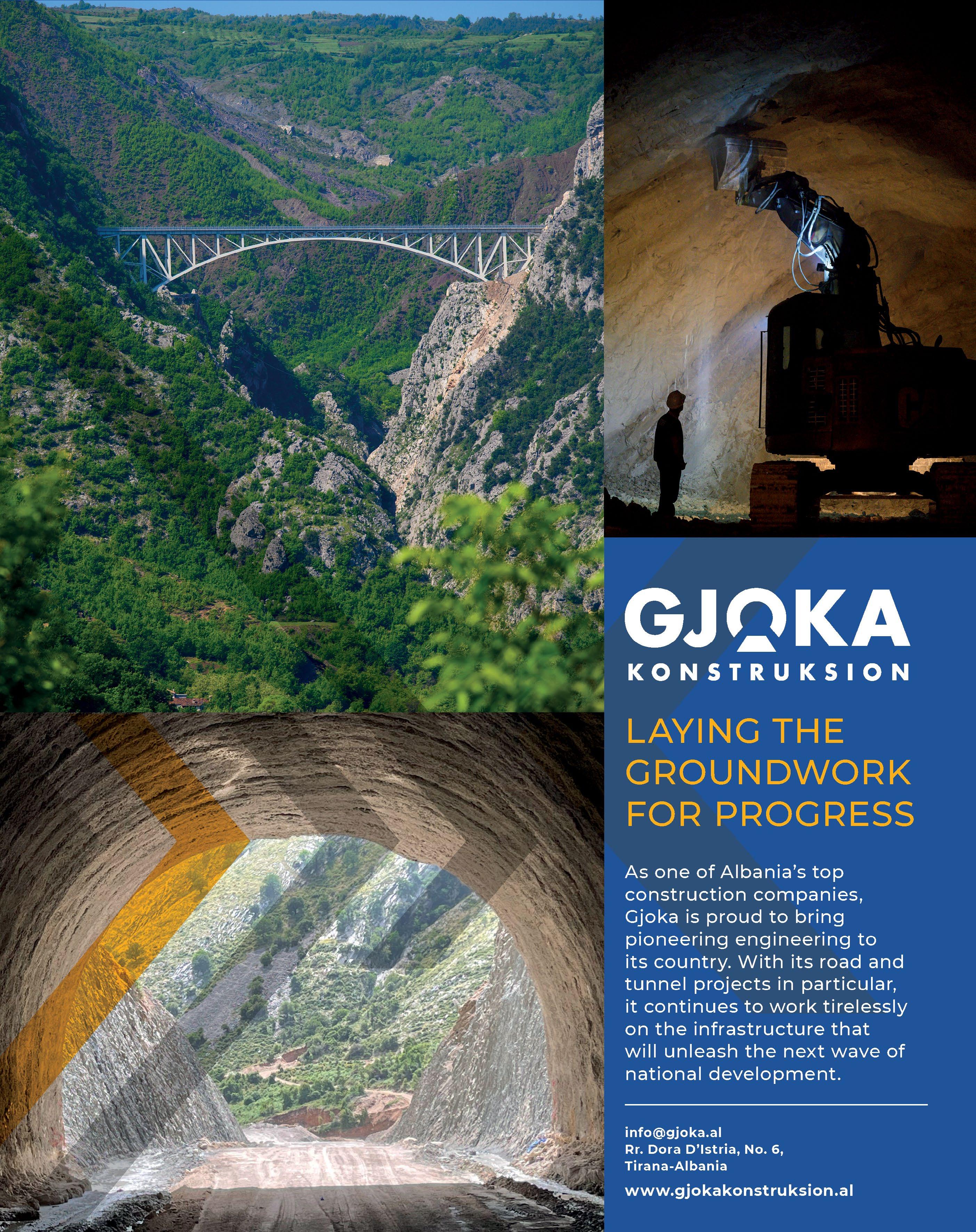








Edi Rama’s re-election in 2021 secured him a third term as Prime Minister, and with it renewed the strong popular mandate for his vision of Albania joining the EU. With MEPs having officially requested the European Council begin accession talks, Rama and his government now face the challenge of maintaining course through turbulent geopolitical waters.
hen outgoing Chancellor Angela Merkel visited Albania in September 2021, her comments offered reassurance for the future of bilateral relations between the two countries. “Regardless of how the German election turns out, any new German Chancellor will have a heart for the region,” she said, speaking at a press conference alongside Albanian Prime Minister Edi Rama.
Yet even facing the departure of a crucial ally in Albania’s drive for EU membership, neither leader could have predicted the seismic changes in the geopolitical landscape by the time of Rama’s visit to Berlin seven months later. His meeting with the newly-appointed Chancellor, Olaf Scholz, took place against the backdrop of the first weeks of Russia’s invasion of Ukraine, and the attendant crises the war has ignited.
With Rama lobbying for continued German support for Albania’s bid, Scholz offered welcome encouragement. “The Western Balkans and their integration into the EU are very important to me,” he told a joint press conference, stressing that Germany would campaign for entry negotiations to begin as soon as possible.
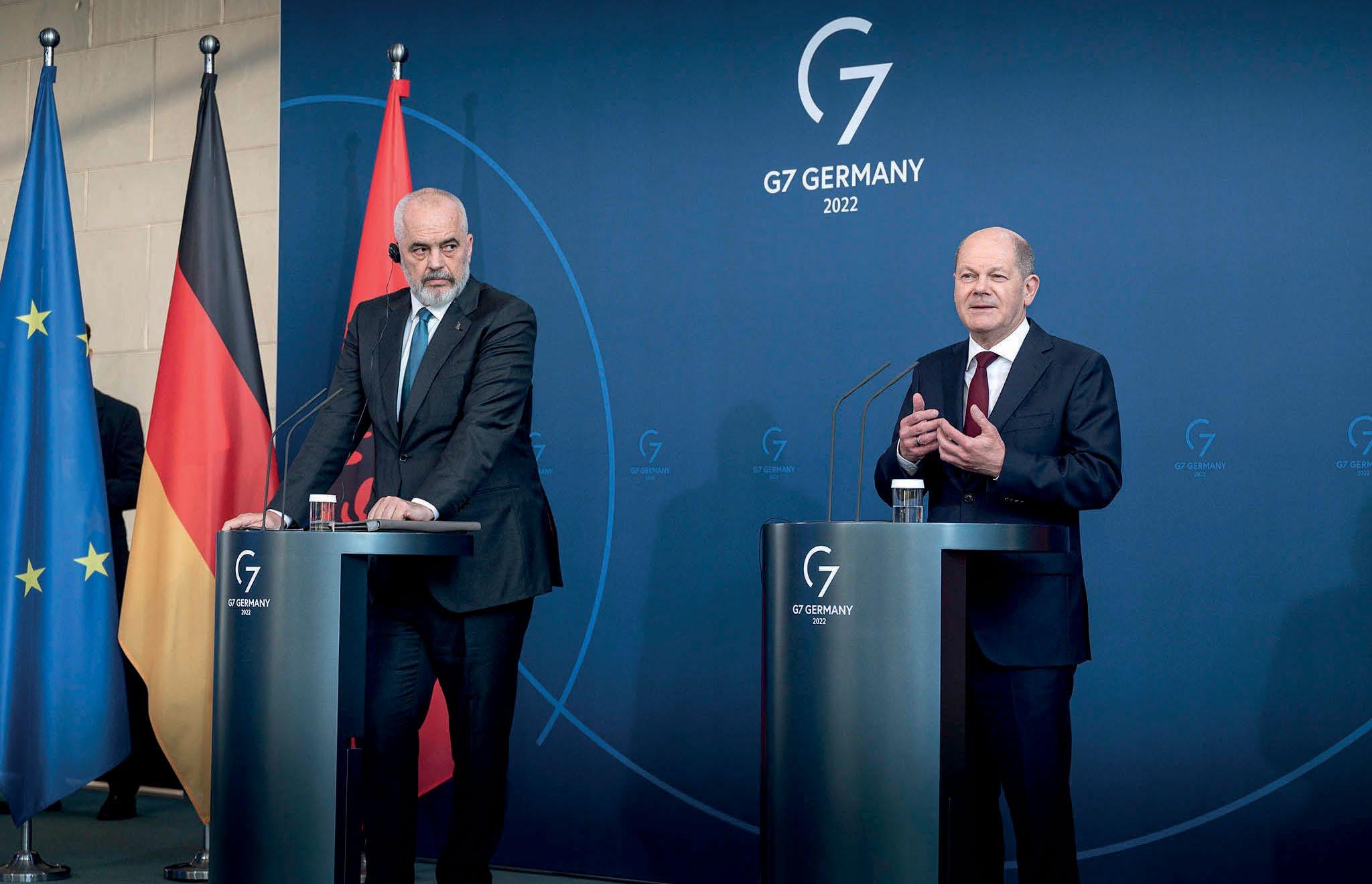
With the Ukraine crisis reinvigorating the appetite for enlargement in parts of the EU, MEPs in May adopted a report officially recommending the EU Council urgently begin Albanian accession talks – a step Rama’s administration sees as critical to the nation’s future. “We have consolidated democratic processes and this would expand the sense of security in the region,” explained Deputy Prime Minister Arben Ahmetaj. “EU membership would lock progressive reforms in place.”
Recent events have only strengthened Albania’s case for membership. As a pro-EU NATO member with an open and resilient economy – 7.6% growth in 2021, and 4% expected in 2022 – welcoming Albania would bolster the bloc’s credentials as the natural home of liberal democracies, and expand its influence in the region. Moreover, as a country whose domestic energy generation comes 100% from hydropower, and which is working on multiple projects to diversify and expand its renewables infrastructure, the
to help
alleviate Europe’s energy supply struggles offers further enticement.
The commencement of talks would stave off the threat of frustration building in a nation which has been an official candidate for membership since 2014, and which feels it has done everything asked of it by the EU. “We have been very good about our homework,” said Energy Minister Belinda Balluku of the raft of reforms Albania has undertaken in preparation. “Albania is now very close.”
On the domestic front, a major priority is improving the output and efficiency of the nation’s agriculture sector. With the average farm size standing at just 1.3 hectares, fragmentation is a problem in a country where the memory of communist-era cooperatives is a barrier to collaboration. “We can’t reach the level of production we need unless we all cooperate,” explained Agriculture Minister Frida Krifca.
With the goal of increasing exports to $1billion by 2030, Krifca sees strengthening food security throughout the sector as crucial. With EU support, Krifca’s ministry is overseeing the reform of control procedures, centered around digitalization and traceability, and associated legal frameworks. In addition, four new open markets around the country will enable cooperation and provide new routes to market for agricultural operators. With money also being invested in training and agrotourism, a more robust and diversified agriculture sector is taking shape.
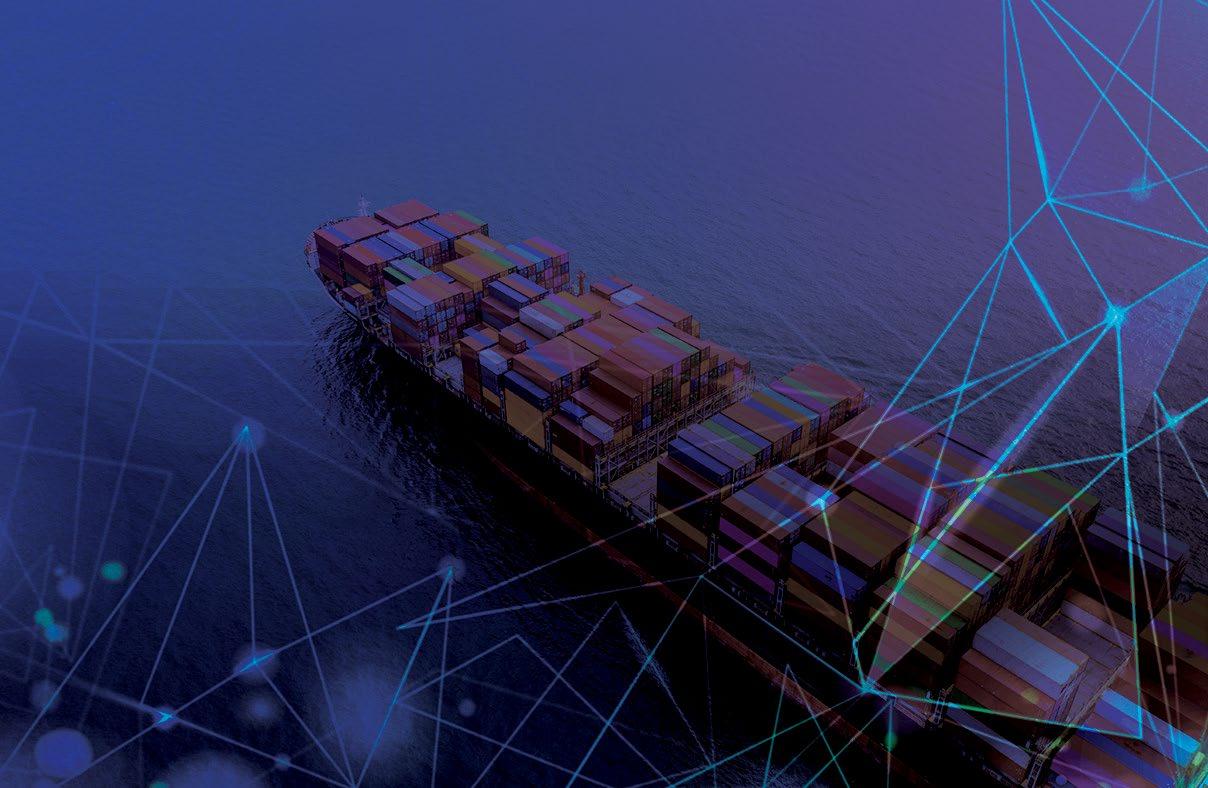 ARBEN AHMETAJ DEPUTY PRIME MINISTER OF ALBANIA
ARBEN AHMETAJ DEPUTY PRIME MINISTER OF ALBANIA
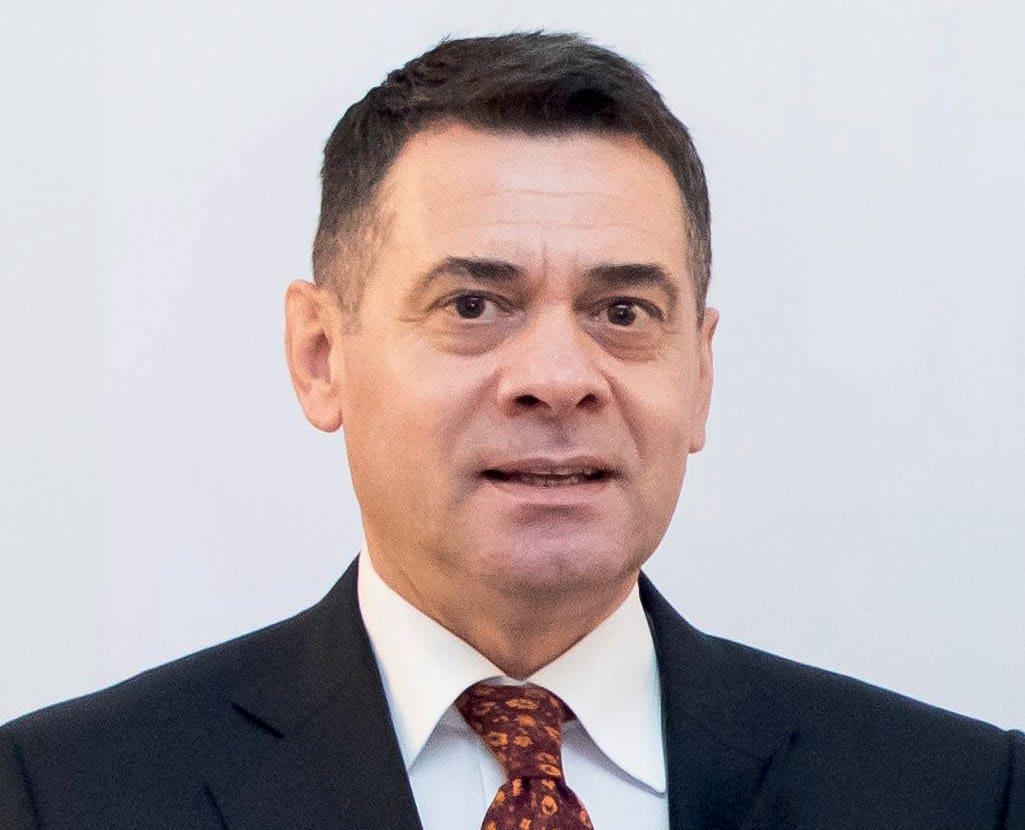
Albania,



the challenges faced by his country and the opportunities that lie ahead.
Albania has faced a devastating earthquake, the Covid pandemic, and now war in Europe. How is the country dealing with these crises?
The earthquake of 2019 was the worst in 45 years, directly affecting over 200,000 people. But the government was there from day one, working on a unique reconstruction and social program. Most families are back home and we’re erecting 167 schools and public buildings.
Then came the pandemic, and the government has provided relief here as well through medical, public health and financial measures.
The consequences of the invasion of Ukraine are felt heavily in Albania. But this government is going to navigate it successfully as well.
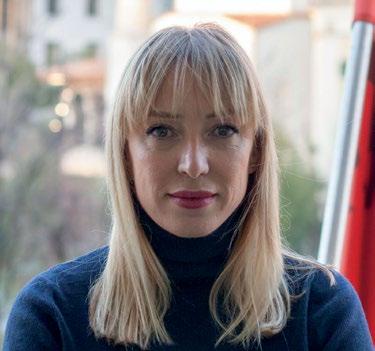
What has this government done to attract foreign direct investment (FDI)?
We have taken many steps – procedural, legal, financial, fiscal – to attract FDI successfully. We have a very good package of incentives for energy, agriculture, and tourism.
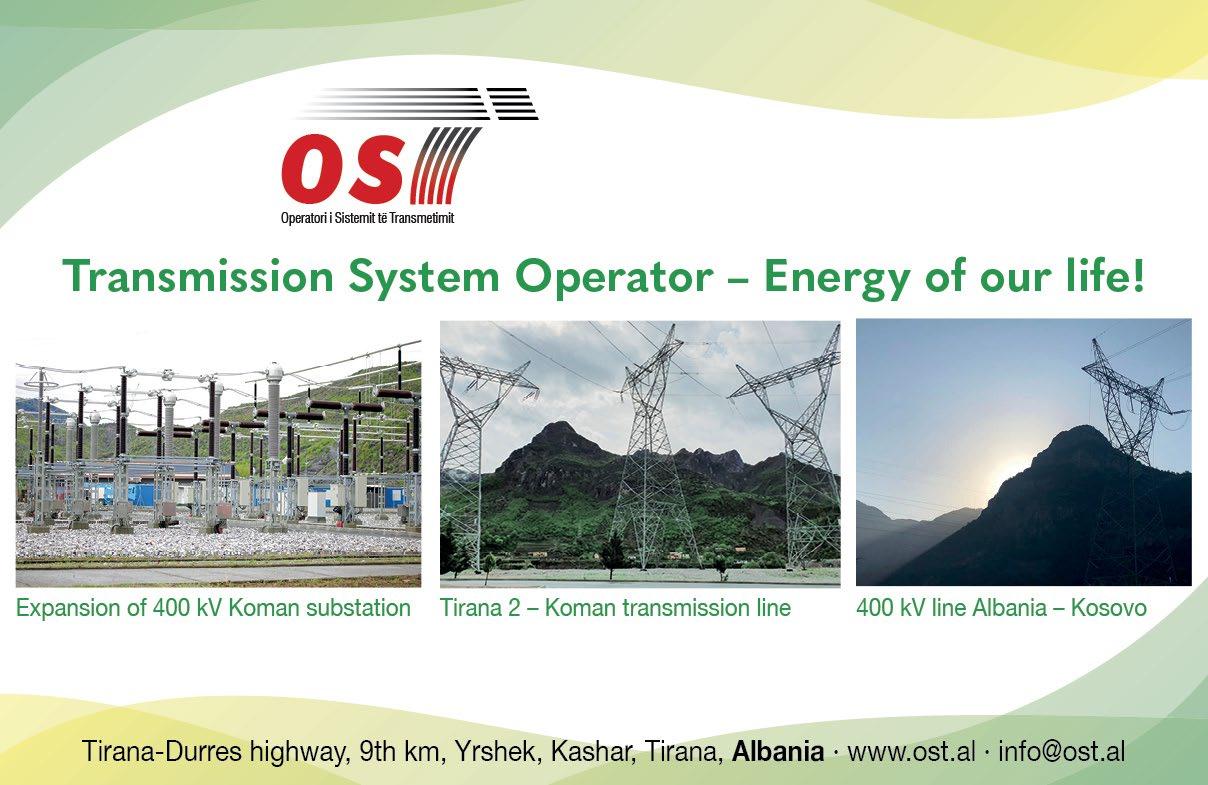
What is your assessment of the EU accession talks?
We are Europeans, and the EU is our natural home. Our aspiration to become a member of the EU remains unshakable. Membership in the EU is really the key reform that will improve the life of Albanian citizens.
Which sectors do you see driving Albania’s continued economic recovery?
Our economy bounced back quickly because it is based on a dynamic model. The sectors where we have placed our hopes are energy, tourism, and export-oriented manufacturing. And business processes are booming, especially the IT part of it. We have drafted and will soon pass interesting legislation on IT nomads, start-ups and technology parks with zero bottlenecks in terms of fiscal and bureaucratic procedures. This could turn Albania into an IT destination in the next 7 to 10 years.
Where does Albania see opportunities for cooperation with Germany’s new government? There is no change in course in the relationship: we remain very close. I have had some very good meetings with members of the current government and I have felt the same attitude towards our bilateral relations.
durresport.al
We have drafted, and will soon pass, interesting legislation on IT nomads, startups and technology parks.
”Frida Krifca , Minister of Agriculture and Rural Development
All energy ministers in Europe are having to answer two questions these days: why are energy prices so high? And what is your government doing about it? Actually, our citizens are not asking us why prices are so high because we made a very bold decision to protect the country’s households as well as small and midsize businesses. We started to face this problem of high prices last summer, and throughout autumn we were under intense pressure regarding our energy imports, because Albania produces 100% renewable energy, but it’s all based on hydropower plants. This makes us very dependent on the weather, and this is the third consecutive year of drought in Albania. That's why during the dry years we are forced to buy in the market more than 30% of our energy, while during the wet years it’s only 20%. In October the government decided to create a package to subsidize energy. We are paying the difference that has been created by the high prices in the market, but we have made the decision that this situation will not affect households or small and medium businesses, which are the engine of the economy. So for the moment people are safe.
Besides subsidized prices for consumers, how is the government dealing with the issue on a bigger scale?
We have created a new mode of operation, depositing energy in neighboring countries and taking it back on the days that we need that energy. We are also exchanging energy with our neighbors. And a third tool is longterm buying contracts: no more intraday or intraweek purchases, but in quarters or even longer periods. So we have managed this situation in the best possible way and our hope is to protect our citizens as long as the state budget will allow it, while ensuring good management of the Drin River cascade and all the other instruments at our disposal.
An inter-ministerial group has been created to assess the impact of the Ukraine war on the economy, particularly on energy and infrastructure. What scenarios are you working with?
It’s like the pandemic: we hoped that everything would be resolved in a few weeks or months, but it took about two years. I believe that this war will last a long time and that the
economic impact on Europe will be much longer than the war itself. We are prepared and working on strategies to create first of all energy security for Albania, which is very important. For more than three years we have been working to diversify our sources, always keeping in mind that we are like an island in the middle of Europe producing only renewable energy; we want to remain this way by creating wind parks and photovoltaic (PV) plants. But I also strongly believe that for a country to have energy security, it needs to have a reliable source. Last year we saw the problem in the North Sea, where all that capital-intensive investment in wind parks produced 50% less energy because the wind in 2021 was less fast than in the previous 20 years. One of the problems that we have in the market right now is not just the high prices, but the shortage of capacity. All the nuclear reactors have been decommissioned in Germany, the wind has been slower, and there’s been drought in countries that usually have four seasons. Albania is a four-season country; we usually have rain in autumn, winter and spring. But we didn't have any rain this past autumn. So we’re dealing
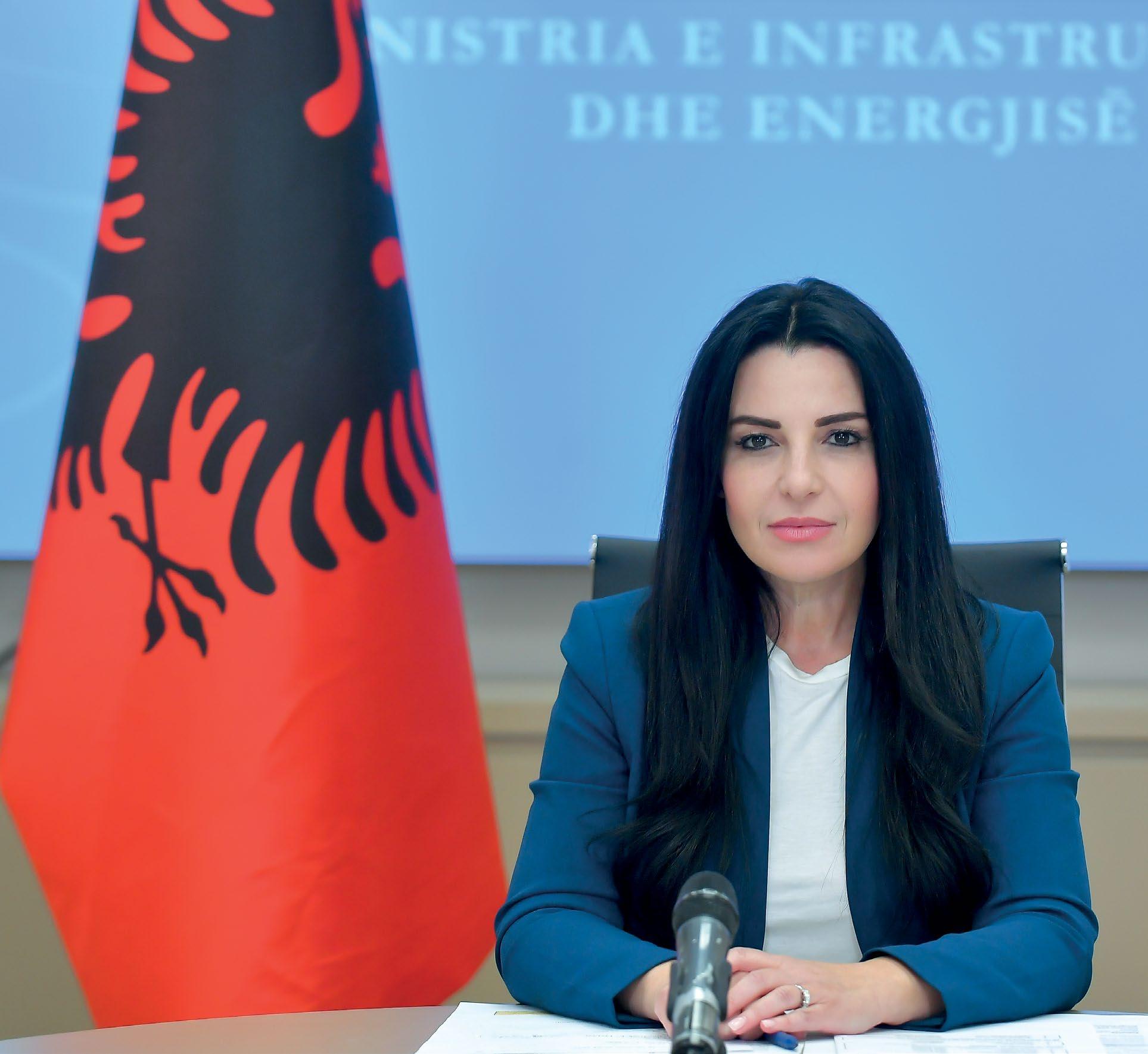
Albanian Minister of Infrastructure and Energy Albania is a small country, but a proEuropean one as well as a member of NATO.
”
Infrastructure and energy have always been crucial for Albania’s development, but recent geopolitical events have made them all the more pivotal. Now, Belinda Balluku is tasked with overseeing projects that will not only play an outsized role in Albania’s growth but also boost energy and supply chain security across Europe as a whole.
with climate change, the unforeseen consequences of the green transition and now, to top it all off, the war.
What specific projects are underway to diversify Albania’s renewable sources?
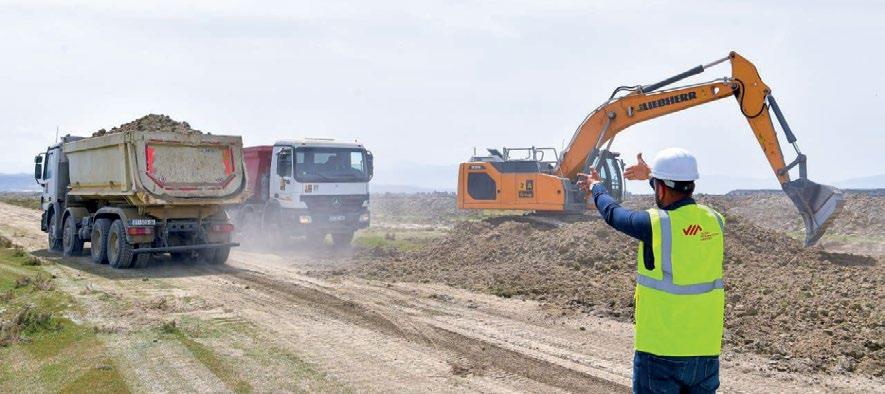
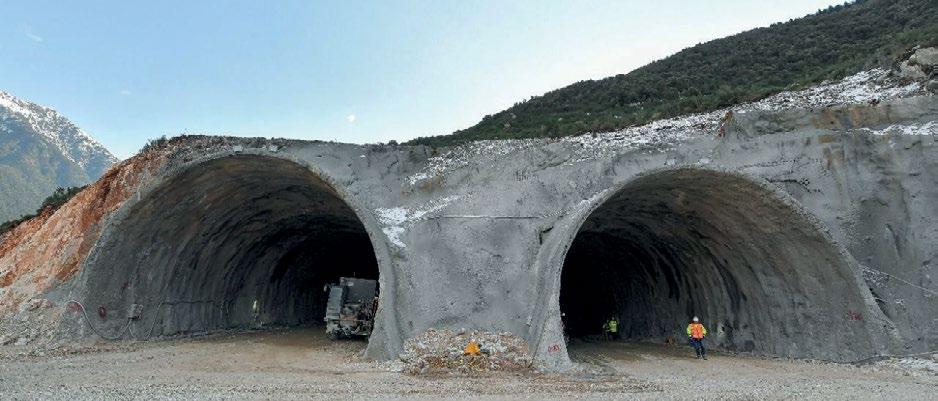
We have some very good, concrete projects right now to develop PV plants on the west side of Albania. And there is Skavica, the fourth hydropower plant of the Drin cascade, which will be built over the next five years. We have already started work there regarding the negotiation of loans, the geological study, the social impact assessment and everything else in the preparatory phase. Skavica has been the dream of every government but it’s happening now and I am proud of it.
We also aim to revitalize a thermal plant located in Vlorë that was built with World Bank support but never went into operation because of a flaw in the cooling system. We found two
very important US partners, ExxonMobil and Excelerate Energy, and did a feasibility study, which was very promising and optimistic. Today we are in an advanced phase to launch this project. In early June we will install two barges that will start to produce around 114 megawatts per hour of energy for Albania. The second phase of the project involves putting the existing thermal plant into operation. The plant was originally meant to run on diesel oil but we are replacing it with liquefied natural gas (LNG) because the cooling system will be easier to operate. It is in a marine area, so it's very important to have a very low-consuming cooling system so as not to negatively affect the sea. There are plans to add 150 megawatts to the plant, up to 250 or 300 megawatts. And the third part of the project, which is the most physical part and very interesting to investors, is the construction of the grid of the pipeline from the floating port of Vlorë to the exit point, located about 32 or 33 kilometers away. This will be built by Excelerate and the Republic of Albania. Keeping in mind that we have been working for a long time now on the proposed Ionian Adriatic Pipeline, we are happy to start with the section from Vlorë to Fier because in the future our aim is to connect Albania with Montenegro, Bosnia Herzegovina and Croatia, and being part of this grid is very important for energy security. Considering that many countries are trying to come out from under the umbrella of Russian gas, this represents a golden moment for us. So this project can be a great opportunity for Albania to become a very important player in the region in terms of gas transmission.
Besides benefiting Albania, can these initiatives solidify the EU accession drive?
I hope our European partners will see it that way. Albania is now very close, I hope, to the accession negotiations. We have been waiting for many years. We are doing everything that is
asked of us. Our legislation is based on the European one, and we have undertaken a reform of the energy sector regarding the unbundling and every other requirement. We have done the same with the sector of potable water, and we are doing the same with transportation regarding the split of companies from railway to aviation. Transparency and a fair market are some of the criteria that we are applying at all levels of government. So we have been very good about our homework. We are now waiting for the possibility to start negotiations.
needed to grow more. That's why the airport of Vlorë and the tunnel of Llogara are very important, because one of the requirements of the big investors of the hotel chains is to have the airport no farther than 45 minutes away. But with that mountain, everything is at least one hour and a half away. And the airport that we are building will be the biggest one in Albania, with a runway of 3.2 kilometers, which means that we will be able to have overseas flights, which we don’t in Tirana because the runway is just 2.8 km. From the new airport we will be able to fly directly to the US and Canada. And as you know, Albania has a big diaspora in that side of the world.
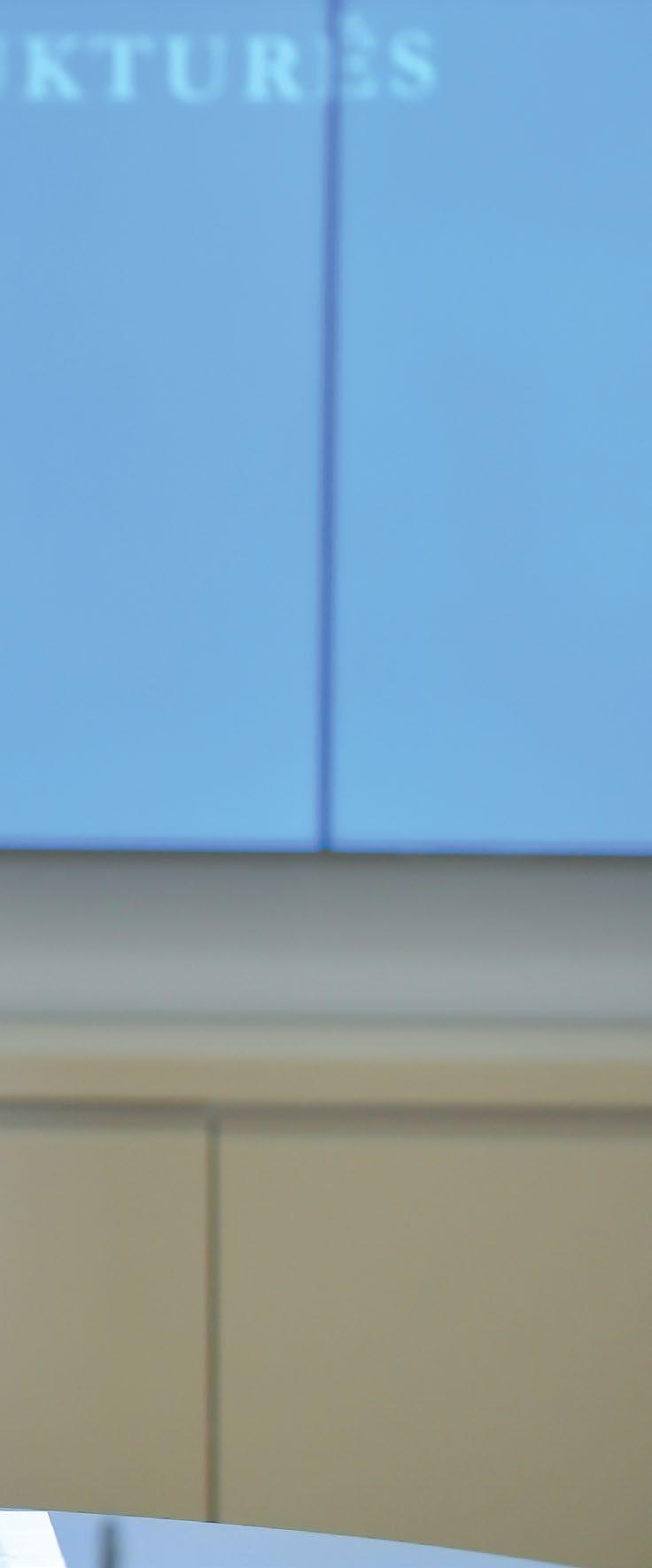
In terms of infrastructure, what are your priorities and goals right now?
The pandemic didn't affect any of our infrastructure plans, although some of the procedures, tenders and loans have been delayed. We have been lucky to go forward with all our big projects. During 2021 we started two of the biggest projects in Albania. One is the airport of Vlorë, which will be the third international airport after Tirana and Kukës. And we are also working on construction of the Llogara Tunnel, a six-kilometer, longrange European tunnel. We are progressing fast and in just four months we already have two kilometers open in the side of the mountain. That tunnel is very important because it's the link that will connect the Adriatic Sea with the Ionian Sea. We have a natural mountain barrier there, and right now to cross this mountain you need 60 minutes. With the tunnel you will need only seven. Tourism is a crucial instrument for the economic growth of Albania, so we are focusing on offering this sector the infrastructure
This ministry is very much connected with foreign investors and private initiatives, so we are very keen and open for every German entity that wants to contribute to this country. They will always get the best treatment from the Albanian administration. We are well known for delivering, for being fast and for being very prudent regarding the procedure, yet without creating unnecessary delays from bureaucracy. So we are open for business and happy to have German companies here because we know how serious they are in their work. We know how they operate.
We will continue to improve ourselves with the hope that the EU will understand that Albania is a small country, but a pro-European one as well as a member of NATO, which nowadays is very important. Albania is playing a very important role in the politics of the Balkans, and we are kind of a catalyst in a region with an old and difficult history. So being pro-European is an added value for Albania.
” We are very keen and open for every German entity that wants to contribute to this country.Construction of the new major airport: Vlora International. Building the Llogara road tunnel.
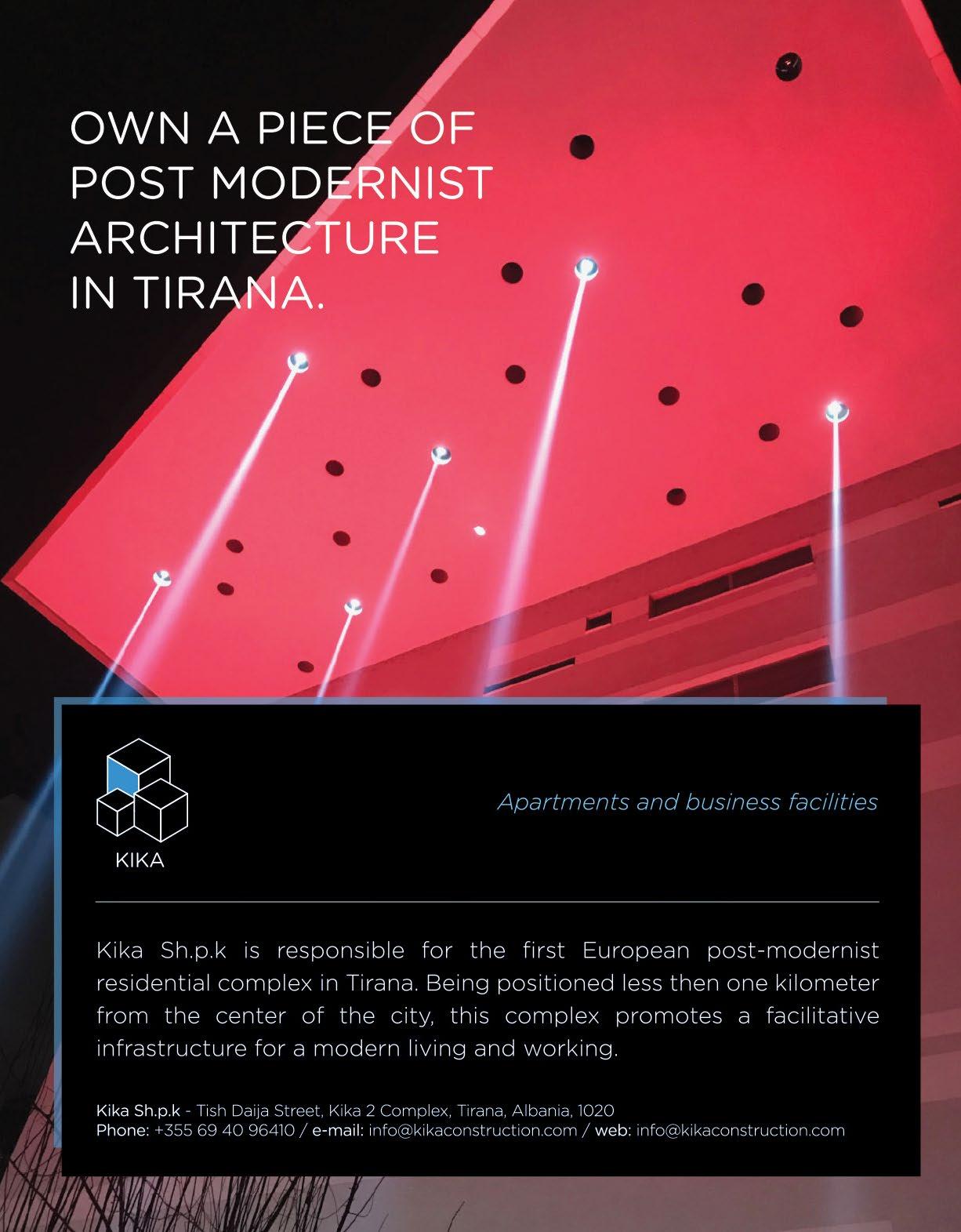
Albania’s infrastructure and energy companies are laying the groundwork for Albania’s growth, while also offering strategic opportunities for partners in Europe. From energy exports to tourist developments, these businesses hold the keys to a more sustainable future.
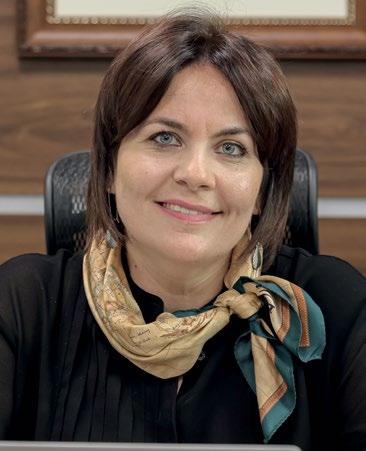
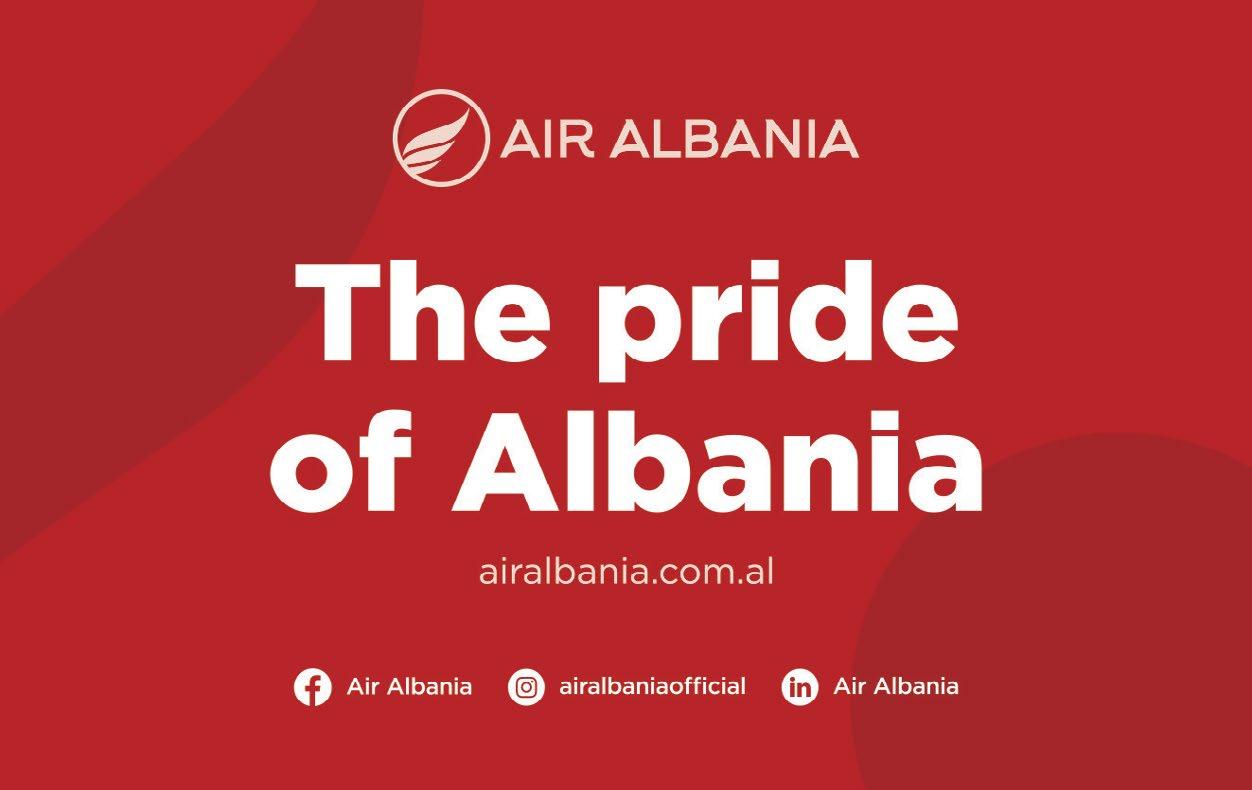
Kika Construction is a family business that entered the construction industry shortly after the fall of the communist regime in the 1990s. Since then, its leadership has embraced outside influence to build some of Albania’s most emblematic buildings. In 2012, with German steel, Italian architects and Albanian engineers, the team built the first cantilever building in Albania. Kika also collaborated with German companies to create residential buildings that offer the German-level lifestyle in central Tirana. Owner Avenir Kika is somewhat of a Germanophile, both working as a regional partner for German companies in the construction industry and sending his engineers to Germany every year to learn about the latest technology. He takes pride

in using German and Austrian construction standards for all his projects. Looking forward, Mr. Kika has plans to build a new sports arena in Tirana and is assessing new developments in one of Europe’s last great hidden beach destinations on the Albanian coast. For both projects, he hopes to collaborate with German partners.
Albania Post may be one of the country’s oldest institutions, but it has its eyes on the future. Far beyond delivering post, Albania’s postal service is focusing on long-term solutions for sustainable growth. Recent years have only underscored its social importance as it delivered pension cheques during COVID-19 lockdowns and lifesaving goods in the wake of the 2019 earthquake. Management continues to prepare for what’s to come with plans to facilitate the e-commerce industry and offer banking services to customers nationwide.
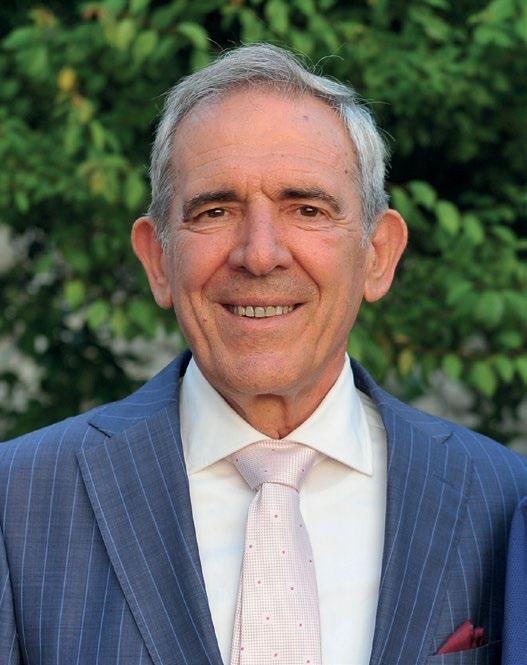
“In Albania, we have an expression: ‘to be as correct as a German, and that’s something that we aspire to”
Avenir Kika, Owner, Kika Construction
“We aim to transform e-commerce in Albania, not through typical post offices but with sustainable digital solutions”
Anisa Kaltanji, CEO, Posta Shqiptare (Albanian Post)POST OFFICE Cantilever during the day
The port of Durrës is the largest port in Albania, handling 90% of the country’s maritime trade and almost 60% of its customs revenue. It is also the de facto port of Kosovo and gaining business from North Macedonia. As part of the government’s ambitious infrastructure plans, the facility is undertaking two simultaneous projects — one to relocate the cargo activity 10km from the current harbor, and another to redevelop the Durrës harbor into a luxury marina for cruise ships and high-end tourism. The guiding vision for the new port facility is to develop a world-class, technologically advanced and sustainable deep-water port that will handle the seaborne cargo for Albania and adjacent countries. New rail, road
and airport links, as well as a dedicated economic zone for production activities, will also facilitate its transition into a regional logistics hub. Construction is set to begin in 2023. “What Barcelona started doing decades ago, or Tallinn is doing now, that is what we are envisioning for Durrës and Vlorë,” explained the Port’s CEO Pirro Vengu.

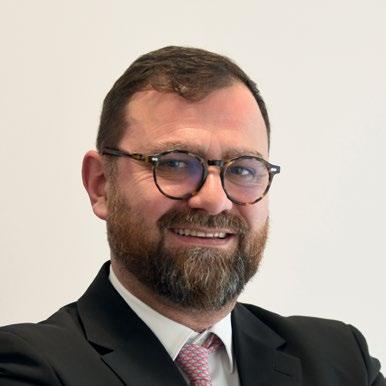
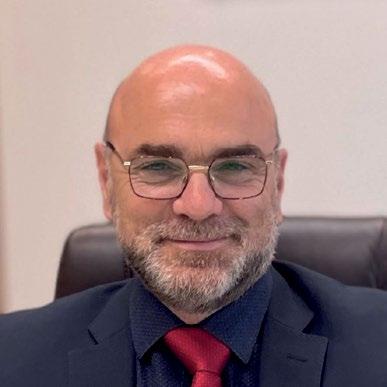
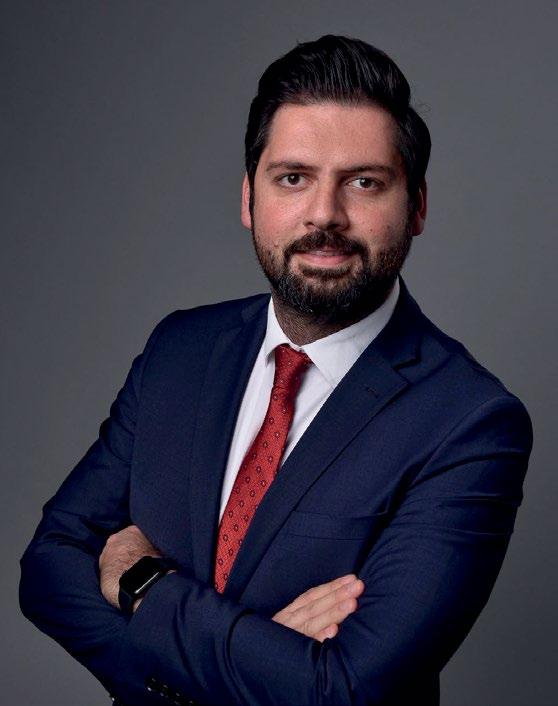
KESH is Albania’s top energy producer, satisfying around 75% of electricity demand entirely through renewables. The bulk of its electricity is produced by hydropower, where KESH continues to add capacity with developments like the planned Skavica Hydropower Plant. However, as Albania is faced with increasing droughts, it is both boosting the efficiency of its current plants and diversifying into wind and solar. Its dams and reservoirs will be increasingly used for photovoltaic energy, including the first floating PV plant in the Western Balkans.
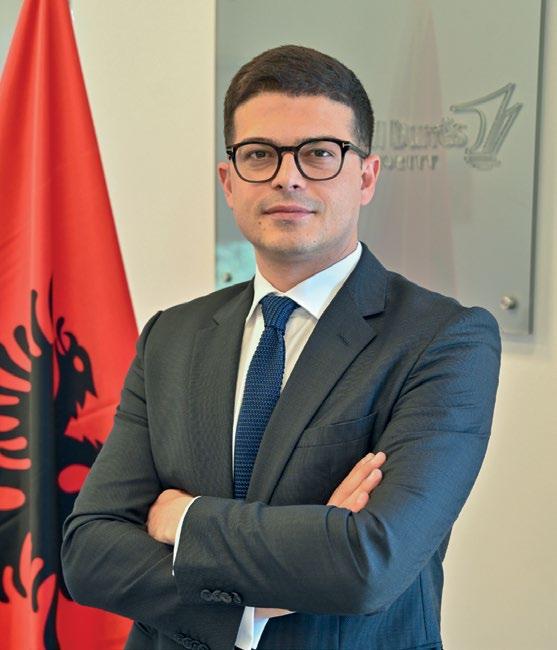
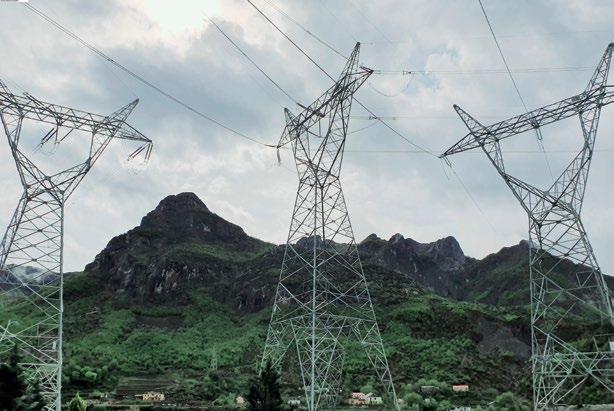
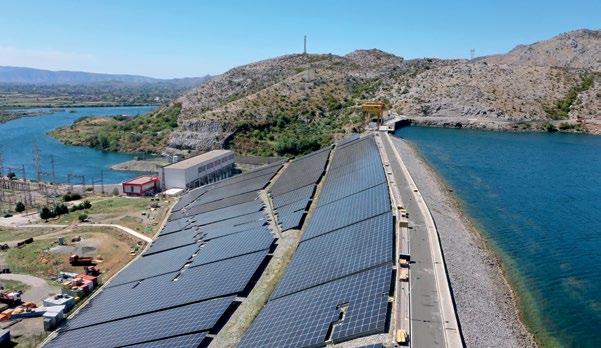
Albania’s Transmission System Operator (OST) generates, transmits and distributes the nation’s electricity. In a major milestone, it created a common energy market with Kosovo, the Albanian Power Exchange, which will begin operations at the end of the year and aims to boost competition and investment in renewables. The company sees a bright future for Albania entering the EU, which would allow the nation to export energy, especially solar in the summer months as long, sunny days mean cheap, abundant energy.
Founded in 2018 in partnership with the award-winning Turkish Airlines, Air Albania began operating in 2019 with a single route to Istanbul and has quickly expanded to serve major European cities, including Düsseldorf. Before the COVID-19 pandemic, Air Albania was carrying around 75,000 passengers per quarter, but lockdowns brought normal activities to a halt. However, during the pandemic, the airline became much more than a flagship carrier, conducting repatriation flights and transporting life-saving cargo, including vaccines. Air Albania’s motto ‘Albanian Pride’ means a lot to the emerging nation. It’s about working to the highest standards and rebuilding a sense of national pride for the country’s youth and diaspora while offering visitors unmatched hospitality. Building on the strengths of a young and international workforce, the airline is poised to grow more than ever on the back of increased tourism and a steady flow of business travelers keen to explore Albania’s booming investment opportunities. Entering the European Union would only catapult the airline further, unlocking routes all over Europe and boosting demand.
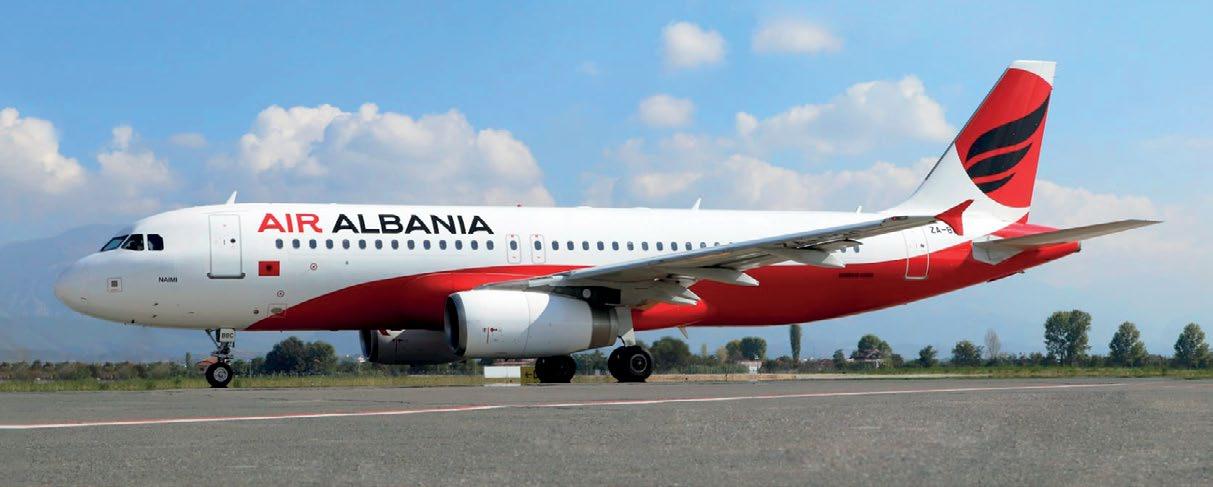
“Sustainable development is the only way forward for the global energy sector”Ergys Verdho, CEO, KESH
“Leapfrogging directly to what’s new, we can build systems, networks before developed countries”
Skerdi Drenova, CEO, OST
“Air Albania began connecting Düsseldorf with Tirana this spring with three times weekly service”
Sinan Dilek , CEO, Air AlbaniaOST
“Albania is a country that deserves to have a more relevant place on the maritime transport world map”
Pirro Vengu, CEO, Durrës Port AuthorityOST Electricity Infrastructure Qyrsaq Dam Naimi Aircraft ‘The integrated Port of Durrës - Porto Romano will become the centre of logistics and port-related commercial activities in Albania and has the potential to become the gateway to the Western Balkans.”
Gjoka Konstruksion, founded in 1994, is one of Albania’s leading construction companies. Today, its team of around 600 is engaged in some of the nation’s most important infrastructure projects, ranging from roads to tunnels to tourism development and water infrastructure. Erind Gjoka explains the importance of these projects for Albania and foreign investors alike.
What would be the challenges and opportunities for your company if Albania enters the EU?
If Albania joined the EU, we would be competing with the biggest players in the sector. Frankly, those companies are bigger and have more know-how. Not only for the people of Albania, but also for us, this is a challenge that we must take on. So, whether we join the EU or not, we are focused on improving and on the future. Even though we know that it will be harder, at least in the first years, we believe that joining the EU would be beneficial for us in the long term.
What are the core strengths in your business and technical expertise that set you apart from any competitors in this market?
First of all, our experience. We were one of the first companies to be created in the private sector in Albania after the dictatorship. That experience means we’ve learned a lot along the way and have invested a lot in human resources. Without people, you cannot do anything. But what I think really sets us apart from the others is our strong will to move forward and to take on the most difficult challenges and projects. These have, in turn, allowed us to gain experience before others and grow faster.
What are the areas in which you specialize?
We’ve mainly been focused on infrastructure projects, roads in particular. That means wherever there’s a road project, we are after it, because this is our specialty. We have also been the leading company in tunnel construction since 2014. There are not many tunnels in Albania, but we have built up a specialized team, starting with mixing local talent with experts from Slovenia, Austria and Turkey. We also invested a lot in machinery. Today, I’m proud to say that we are working on five projects at the same time. I don’t know of anyone in the Balkans now with more tunneling machinery than us. So far, we’ve built around 20km of tunnels. For the Arbër highway, we built
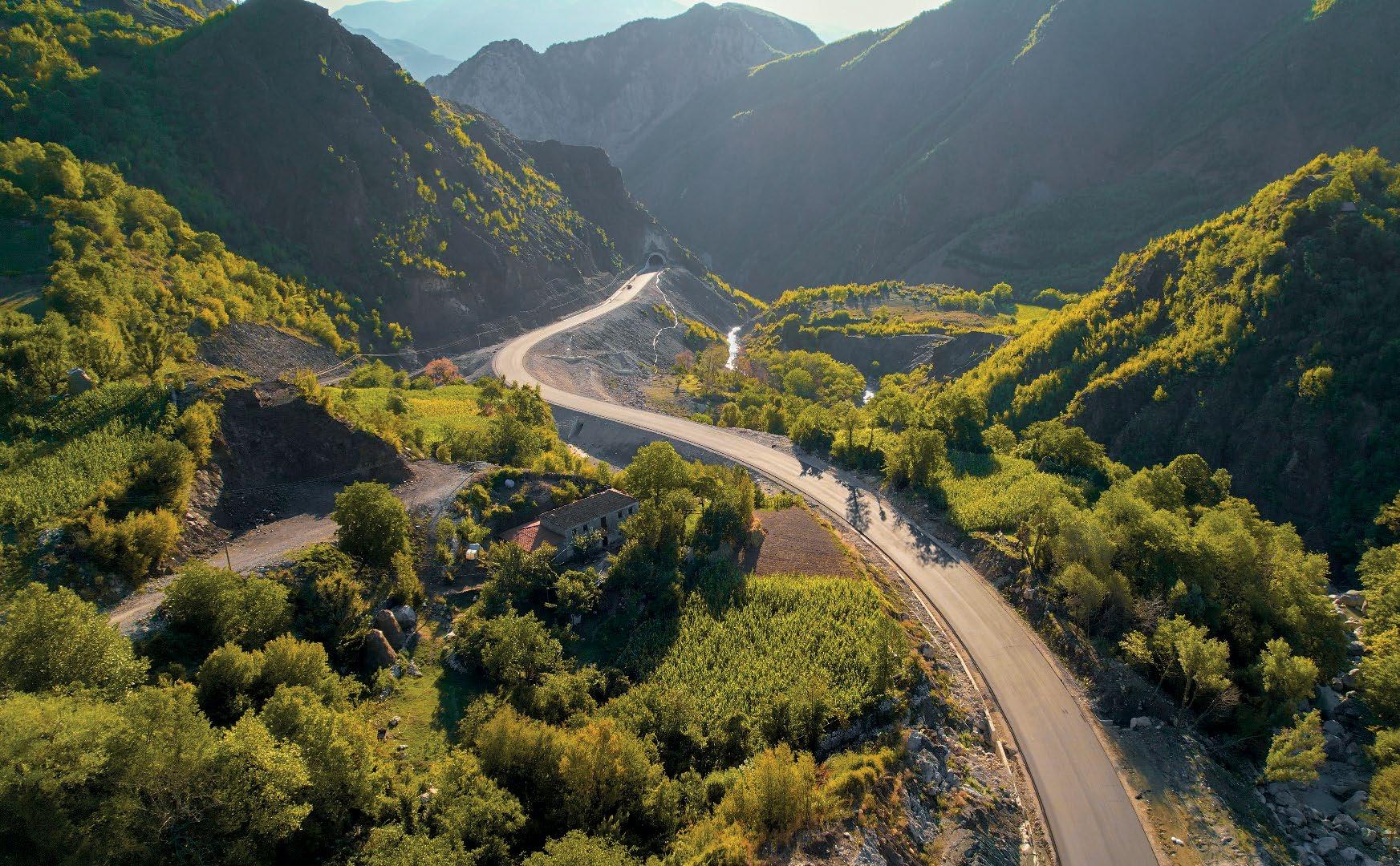
several short tunnels that are separated from each other and one that is 3.8 km long which is very complicated. My engineers say that was more difficult than building a tunnel under the sea because the geology is the worst and there is a big presence of water. It’s been a challenge, but we are about to finish. The road is already open to travelers and has cut a five-hour trip down to two hours. When the last tunnel is open, at the end of this year at the latest, the journey will be 1.5 hours. All the while, we’ve been working 24 hours per day: pandemic, war — it doesn’t matter. But that project, with seven tunnels and four bridges, has served to sharpen our expertise.
We used to just have the Tirana airport, but the recent opening of the Kukës airport for the north is important. They are constructing the Vlorë airport, which will be huge for the whole south coast of Albania. There are very, very beautiful beaches in the south of Albania. And together with the airport of Vlorë, they are about to finish the bypass of Vlorë, which will take you from the airport to the big city with many hotels. But of course, after Vlorë, we have Dhërmi and Himarë, which are even more beautiful beaches. Dhërmi has been called the Ibiza of Albania. It was a place with just small houses and no investments, but it became more and
General Manager, Gjoka Konstruksion
“Whatever’s already done in European countries, you can do in Albania”
We have the people, machinery and local know-how. Together with German expertise, we could do even bigger and better things.
”Arberi Road
What are some of the other important infrastructure projects in Albania right now?
more popular with people living in Tirana. Over the last years, Dhërmi has totally transformed: I don’t know how many hotels were built. But from Vlorë to Dhërmi, you cross through the Llogara mountain national park. It has gorgeous views but it’s challenging for people who don’t like driving. In November, we just started the tunnel of Llogara, which will allow people to take a six-kilometer tunnel rather than driving over the mountain. We are subcontractors in that project, and the main contractors are two Turkish companies with a lot of experience in tunnels. That’s the biggest project we have at the moment. Already in four months, we opened 1.9 kilometers, which for Albania, at least, is a record. If it continues like this, we will finish it one year early. We started in December 2021 and had 33 months to complete it, but I think it will be ready by the end of 2023.
It seems like this tunnel will help attract more investment.
Last year, when the government said they would start this project, no one believed it. But since the tunnel’s been opened, at least 10 new projects have been developed in the area. It is because that tunnel opens the gate to a hidden place that Albanians love, but was hard to access for foreign tourists, who were mainly going to Tirana, Durres, Kavaje and Golem, which are all around 40 away minutes from the airport. But now, with the airport of Vlorë and projects like the tunnel, we’ll be able to attract elite tourism for the first time.
ect, you’re investing in energy but at the same time, you also do the construction. We have done projects like water utilization in Tirana, and we are currently developing a 55,000-square-meter residential complex and a 200-room hotel near the beach. We want to get more into the tourism sector because it has so
I would say that we would follow the projects jointly, like shareholders. We’d both bring our experience to the table and make joint decisions to move forward on projects. But of course, not all projects are the same. Albania is just building its first railway in 30 years, with
ny is built like that, it is built from scratch with honesty and hard work. If someone comes to us, it must be someone that is a hard worker too, if not, we will not speak the same language. Money is not everything for us. We want people to like working here, to feel satisfied with a job well done and to feel proud of the name.
We’ve talked about your specialties in roads and tunnels, but do you see the company going into other lines of business?
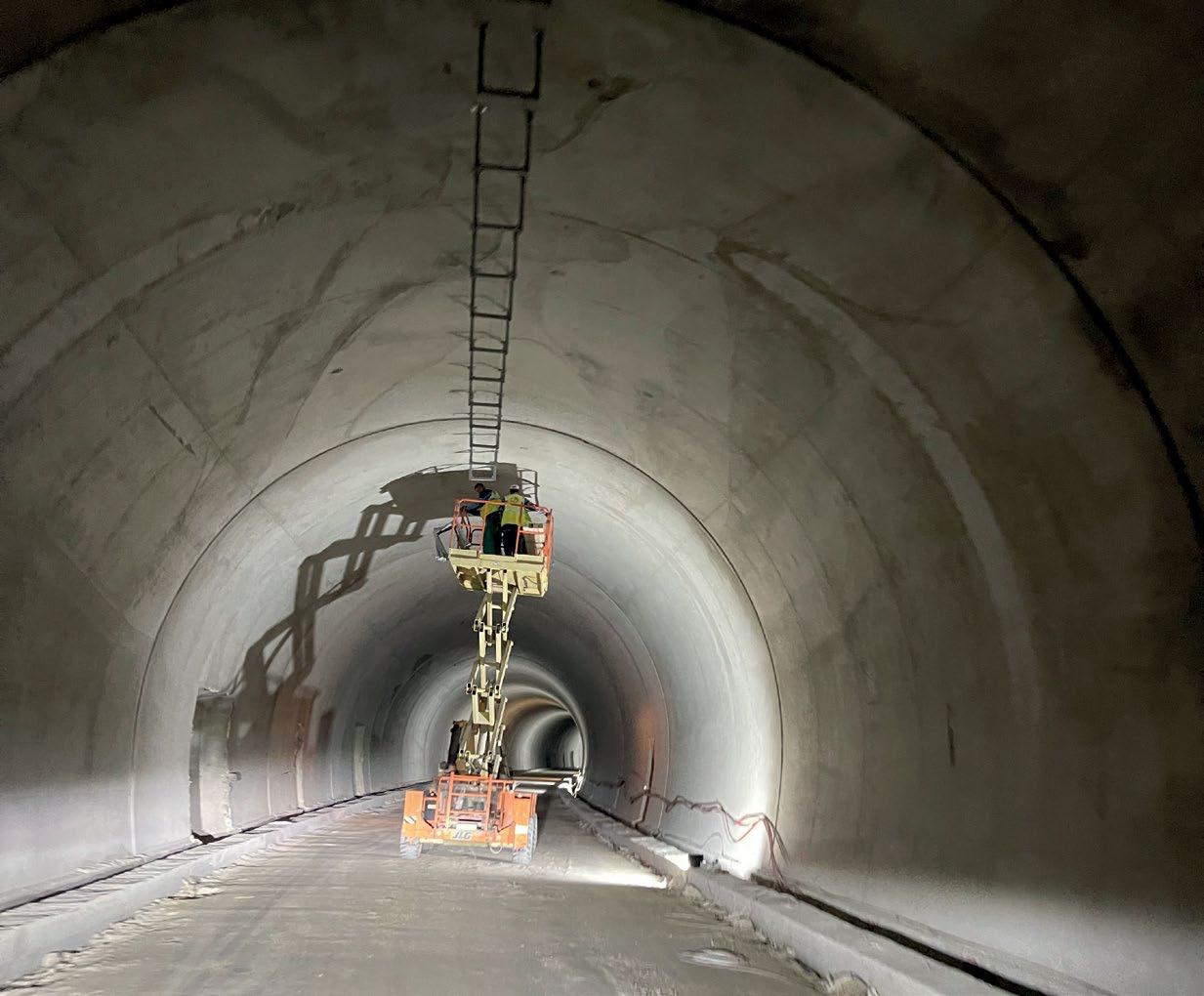
Of course, we are involved in all the lines of construction. We’ve built a 37 megawatt of hydropower plant and are looking at a 20-megawatt photovoltaic project. We are also investing on a 46 megawatt of windfarm in Kosovo. In this kind of proj-
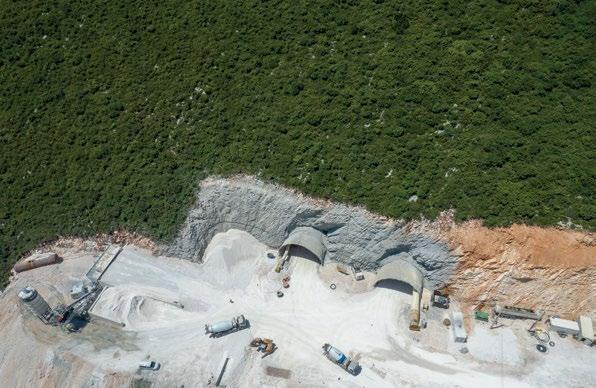
much potential in Albania. Energy too, but that’s worldwide. We are also considering getting into agriculture, but we need the know-how and to find the right people because we don’t have experience there. We are careful though because we don’t want to spread ourselves too thin.
Are you looking at opportunities outside of Albania?
We competed for the Karawanka Tunnel that connects Slovenia with Austria, but a Turkish company came in with a lower bid. However, I’m happy we tried because we learned more about the procedure. If we had won, we would have been ready to work there too. In Croatia, there is a big demand as well because they don’t have people to work there. On many occasions, we’ve been invited to join forces with Croatian companies, and we’re evaluating the possibility. But our main aim is to be present at least in Kosovo and Macedonia, and maybe also Montenegro.
I think with German companies we can join forces in every way, all options are open. Clearly, we don’t have the same level of expertise and know-how as German companies, though we are improving rapidly. Experience is key and German companies began before us and their expertise is key. We would definitely be open to collaborating. We are present here, we have the people, machinery, know-how and understanding of the local culture, but of course, together with German engineering and expertise, we could do much bigger and better things.
new technology and an Italian company. We haven’t built a rail network before, but there will be other projects in this area. So for something like that, Germans could bring the know-how and we could do the civil work.
Do you see yourself and your company instrumental in building a model for Albania?
Yes, I want to improve the quality of everything that we do. We do a good job today, but I want to do a better job tomorrow. And I want the company that my father built to keep growing in the best way possible with a good reputation. Everything we do must be good, even 20 years later, because roads, bridges and tunnels are things that our community uses every day. We need to keep a good name for ourselves, not just for the company but for the 600 people on the team and the entire community.
What sort of image do you want Gjoka Konstruksion to evoke?
I want my company’s name to evoke safety and respect. I don’t want people to have any doubts about our work and I want the company to be transparent. Because this compa -
Does your job make you proud?
Yes, of course, so much. I’m very proud of what my father achieved and what we are achieving together now.
What are your thoughts about how people, especially those in Europe, see Albania right now?
I think that this is the moment for Albania to shine. I cannot speak about political strategy because I am a businessman but what I can understand is that Albania must be taken more seriously by the EU. We’ve done so much, and our mentality is totally western.
I genuinely don’t think that there is a country or population that loves the US more than we do. And I am saying the US, but I mean Europe and the West too, it’s the same mentality. Overall, I think we deserve more trust than they put in us. I believe in our capabilities and the fact that Albania has so much room to grow and to become a much better country than it is today.
On the other hand, Albania has everything to offer: we have mountains, seas, rivers, we have the four seasons. It offers every kind of opportunity for every kind of investment. Whatever is already done in the European countries, you can do in Albania.
” We believe that joining the EU would be beneficial for us in the long term.
Albania’s import-dominated pharmaceutical sector favors alliances between global brands and local distributors. Industry leader Rejsi Farma, an early adopter of EU standards, is a favored partner in a post-pandemic market with growing demand for pharmaceutical products.
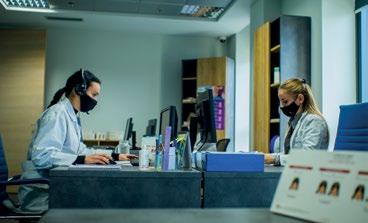
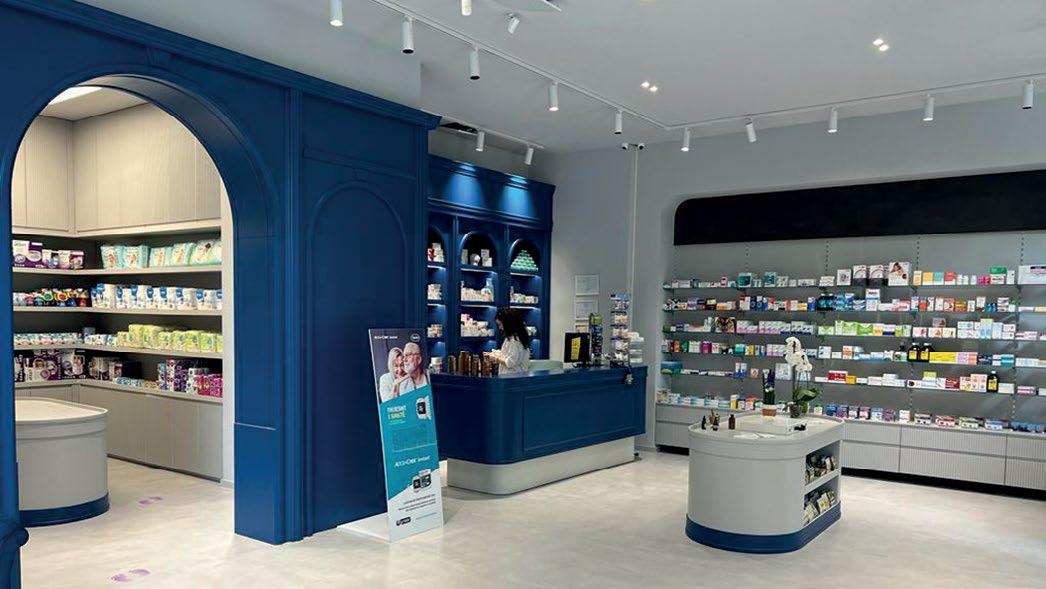
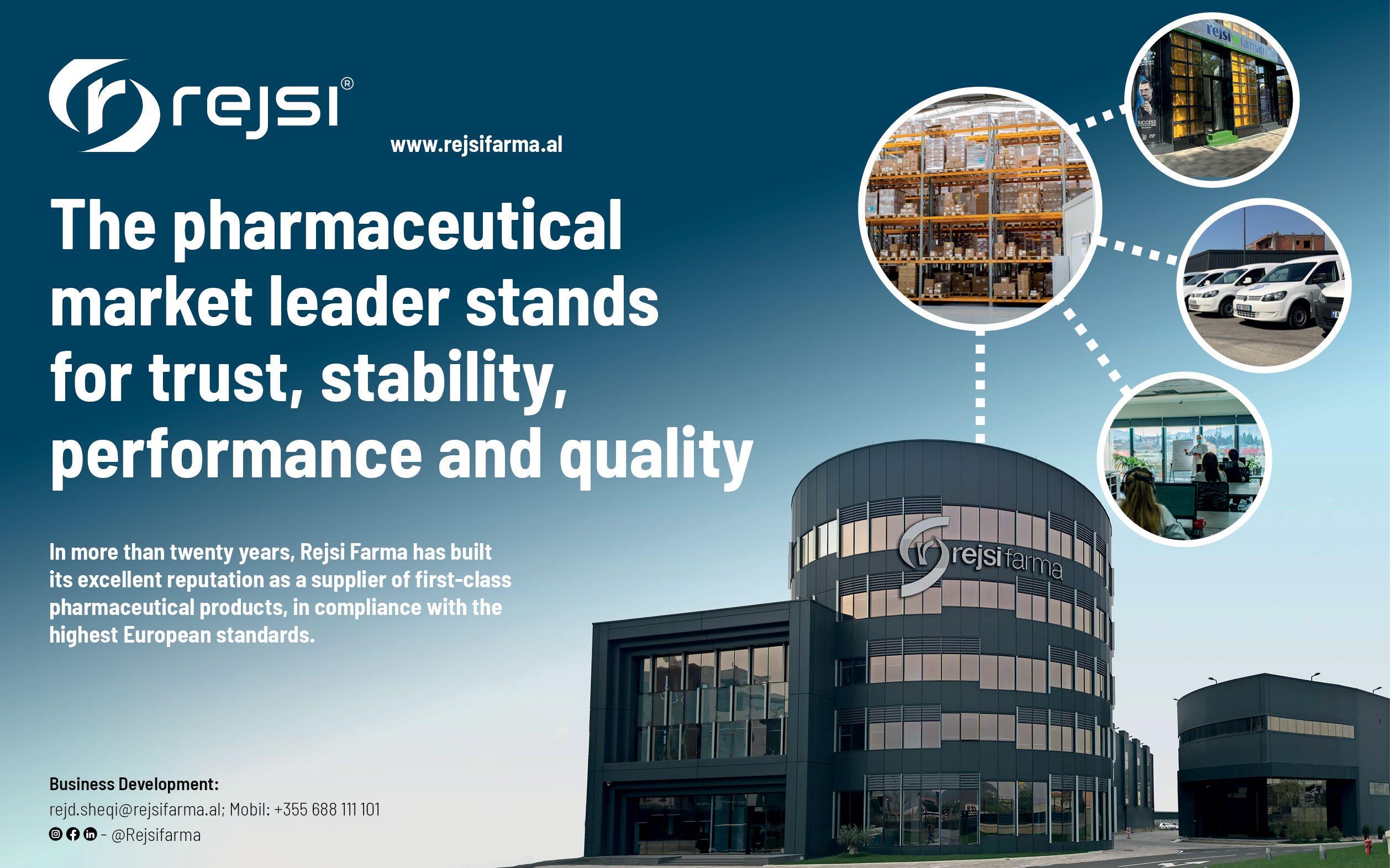
When the Covid-19 pandemic hit, Albania was one of the first Western Balkan nations to begin mass immunizations. Declaring “war” on the coronavirus, the Edi Rama administration made early efforts to secure vaccines, first through the COVAX initiative and later through manufacturers like Pfizer.
The pandemic also increased demand for pharmaceutical products in this country of around 2.9 million. The spike in requests for over-the-counter drugs, vitamins and food supplements creates new opportunities for a sector where locally manufactured products are experiencing growth but imports continue to dominate. In 2020, Albanian imports from the U.S. alone reached $232 million. Trade experts see potential in drugs for cardiovascular disease, cancer and diabetes, as well as in vitamins, minerals and food supplements, a market described as under-developed.
The industry is monitored by the Health Ministry and all drugs must be registered with the National Agency for Drugs and Medical Equipment, which is in charge of guaranteeing drug quality and safety. And in a sector so reliant on cooperation with global brands, adherence to interna-
tional standards becomes crucial, particularly with Albania poised to begin EU accession talks.
“If Albania joins the EU in the near future, it will open more doors for German companies to enter Albania,” says Merita Sheqi, co-founder and CEO of market leader Rejsi Farma. Founded in 1998, this company was an early adopter of EU regulatory standards, and this vision has enabled it to become a favored partner for global firms like Germany’s Fresenius Kabi and Denk Pharma.
“Since our company was founded, the role models for us have been Western companies,” notes Sheqi, whose firm has a turnover of €35 million, up from €31 million in 2018. “We share a common approach of conducting business. Rejsi Farma has the willingness and ability to fulfill the needs and standards of global brands for the Albanian market.”
Mirroring Albania’s broader development push, Rejsi Farma has ambitious plans that include regional expansion into Kosovo, North Macedonia and Montenegro; a pharmacy chain project and a modernized e-commerce platform. Sheqi says their partners can also expect EU-compliant services in distribution, regulatory affairs, logistics and pharmacovigilance. “Even more importantly, Rejsi Farma offers its partners stability, a long-term fruitful collaboration, and loyalty.”
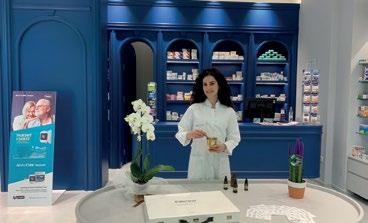
The pandemic has increased demand for pharmaceutical products
“Business is my passion”
With over 20 years to back its expertise, this industry leader – both in terms of turnover and performance – has weathered the pandemic and emerged on the other side with big plans.
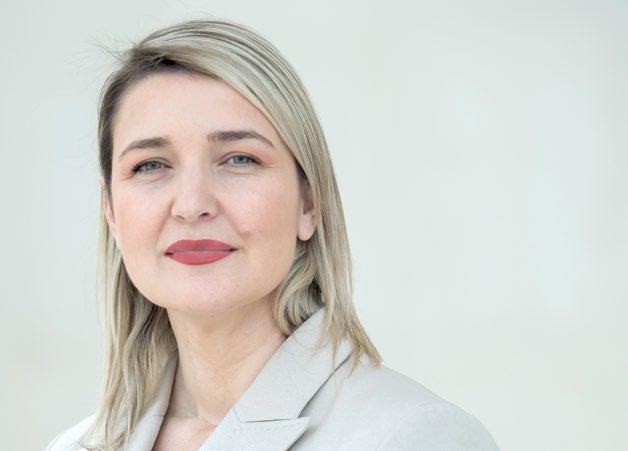
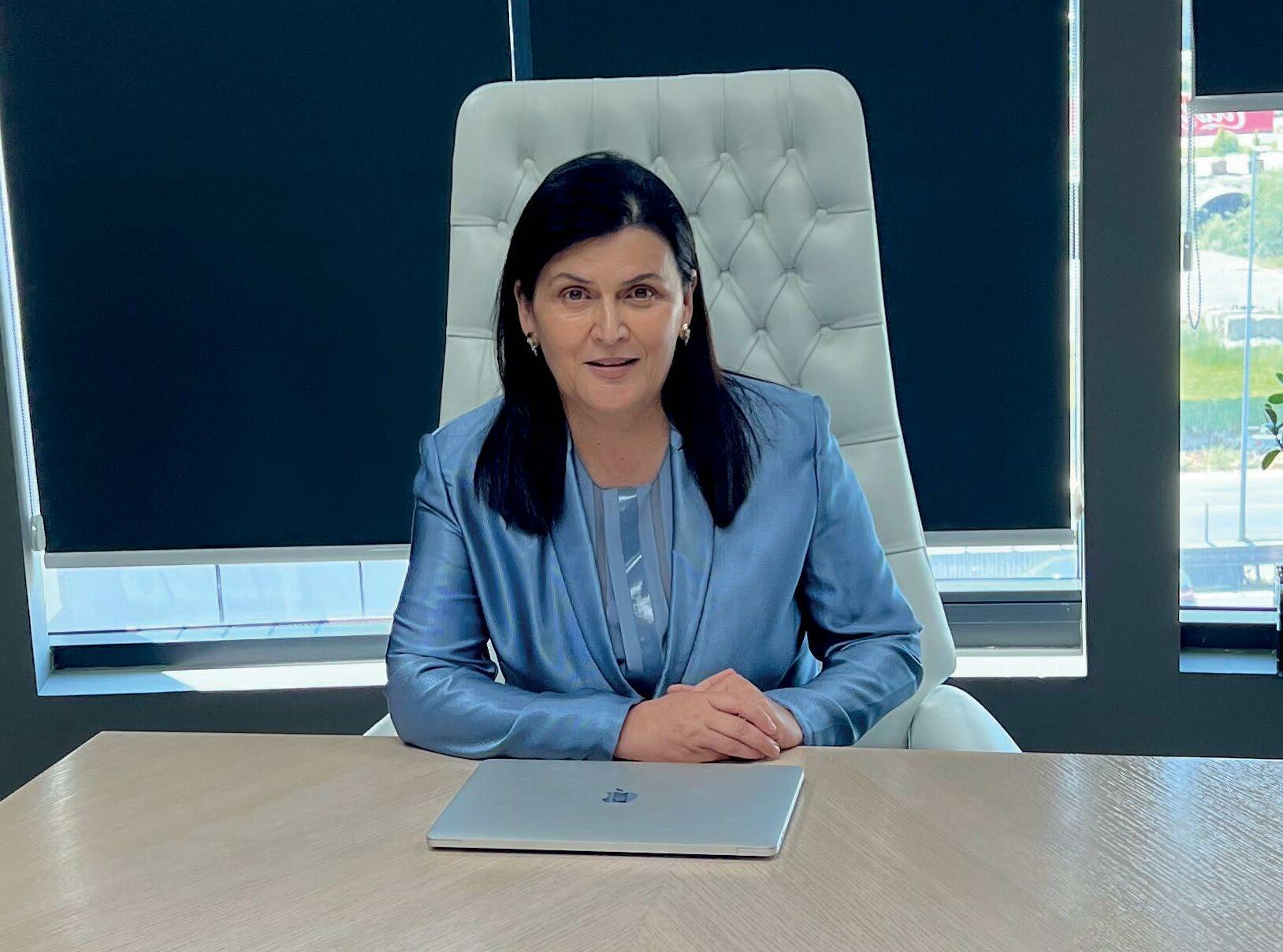
lbania is poised to begin EU accession talks, and Rejsi Farma is better positioned than anyone else to make a smooth transition as it already works to European quality and regulatory standards and partners with well-known international brands.projection to create at least 100 pharmacies over the coming years, and there is an opportunity to create a relationship with EU companies to share best experiences and to develop potential partnerships.
What is your market position in Albania in terms of the distribution of branded pharmaceuticals?
For more than a decade we have enjoyed the top position as a distribution company in Albania. The 2021 IQVIA Report officially re-confirms Rejsi Farma as the market leader. However, our focus is to be number one not just in turnover, but also in fulfilling all the requirements in terms of adherence to EU regulatory and quality standards. While revenue figures are important, I think that the truly important thing is for our products to be compliant and meet international standards.
What are some of your plans for growth? We are in cooperation with well-known companies and increasingly focusing on the patients. We have plans to open a pharmacy chain with the same philosophy and performance as our company, that is, based on quality and ethics. We have a
You have been working with international brands, including German companies, for 20 years. How has this influenced your work?
Since the beginning, Rejsi Farma’s vision has been to bring Western pharma global brands and to make our market attractive for them, so that Albanians can have the same access to quality products as any Western citizen. During these past 20 years we have learned a lot, and I would say that our partners have ‘educated and trained’ us to conduct business with integrity and ethics.
Are you going to fund your own expansion or are you open to investments?
This is a family-owned company that we built step by step, and we are very proud of it, but of course we are open to suggestions for cooperation with international companies that share the same vision and strategy. We would be truly delighted for such companies to be integrated in our own company via a joint-venture model.
Elva Margariti , Minister of Culture
What are the benefits of EU membership for the cultural sector?
Historically, culturally, geographically, linguistically, spiritually, Albania has always been European. Such cooperation would only bring us closer. Through the EU4Culture program we have already demonstrated the European standards of our professional teams and processes.
Why is it crucial to get Albania’s youth involved in cultural development?
One of our pillars is to merge tourism and preservation. We want to make young generations part of this process by promoting our cultural heritage through technology and digitalization.
How are tech and innovation helping reach a wider audience?
The key element the EU delegation supported was our idea to merge digitalization and the way of promoting it, not just to foreign tourists but also to local populations and particularly children, and to make it accessible to all. These projects will create many openings for young talented people in the digitalization of our cultural heritage, and bring our youth closer to their own heritage. Tourism, art, digitalization, youth and children will create a whole mosaic around art and culture.
Merita Sheqi, Co-founder and CEO, Rejsi Farma
”
A
Continues on page 21 Continues on page 16
Whoever visits Albania will always want to go back.
Besides the wonderful nature and the hospitable people, it is the unique festive atmosphere that invites the visitor to be part of it.
In every corner of Albania there is something happening, a concert, an event, a show for children.
A few months ago the Albanian government launched its newest initiative, called Foreign Culture Week, with the aim of promoting cultural exchange between various countries and cultures, building new bridges of cooperation especially for the new generation, and promoting peace during these difficult times.
biggest investment in culture and art for decades. It brought back the glory and the lost dignity of an important institution of lyrical music in Albania. It was inaugurated on the 65th anniversary of the founding of this important national institution.
Following this investment, work has started on other cultural institutions with an old and outdated infrastructure that had not been renewed for the past 30 years. Currently, the National Museum of Fine Arts is undergoing renovation and upon completion it will have twice as much space for exhibitions, restoration and other activities for the younger generations. The reconstruction work will preserve the current building, which is a cultural monument. Meanwhile, the Music Hall at the University of Arts is also being restored, as it is one of the most important music halls in Albania, built during the 1940s and designed by the Italian architect Gherardo Bosio. This amazing monument will serve both artists and the public. And the National Theater, another iconic institution will get a brand new modern building, designed by Bjarke Ingels and located in the heart of Tirana.
heritage sites were damaged, including but not only castles, towers, churches, mosques, bridges and cultural institutions. Besides the Albanian government’s immediate intervention, the EU donated €40 million through its EU4Culture program to revitalize 27 important cultural objects that carry a special meaning and value to Albanians. The United States was also involved in the process of reconstruction through the Ambassador Fund for Cultural Heritage, which was donated to complete the work in two important Albanian castles, Kruja and Preza.
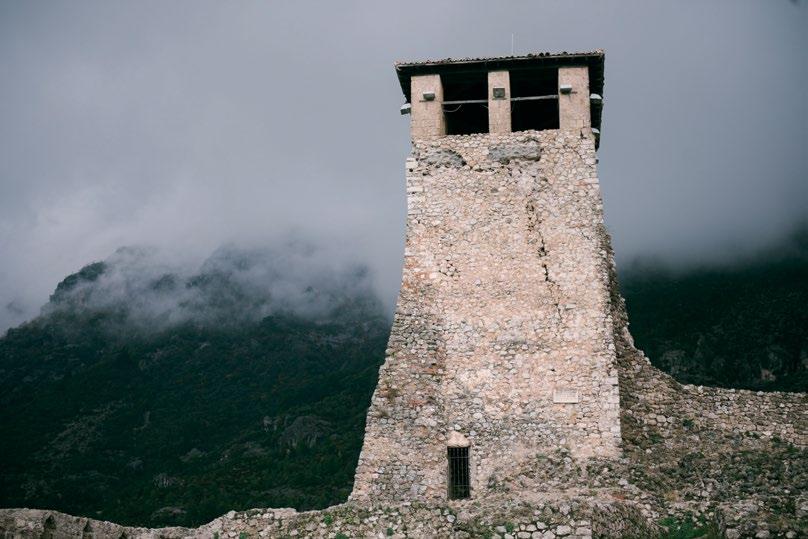
Seventeen states (France, USA, Greece, Italy, Israel, Spain, Germany, Japan, UAE, Sweden, Egypt, Austria, Hungary, China, UK, Turkey and Kosovo) and the EU representative in Albania are part of this initiative offering a variety of activities throughout the year, bringing together Albanian and foreign artists.
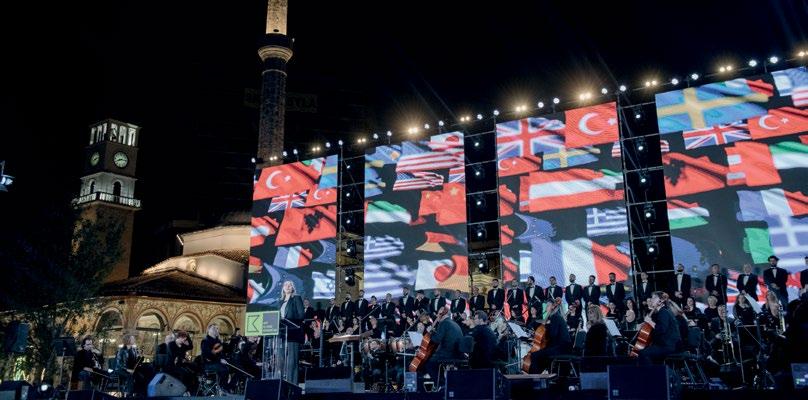
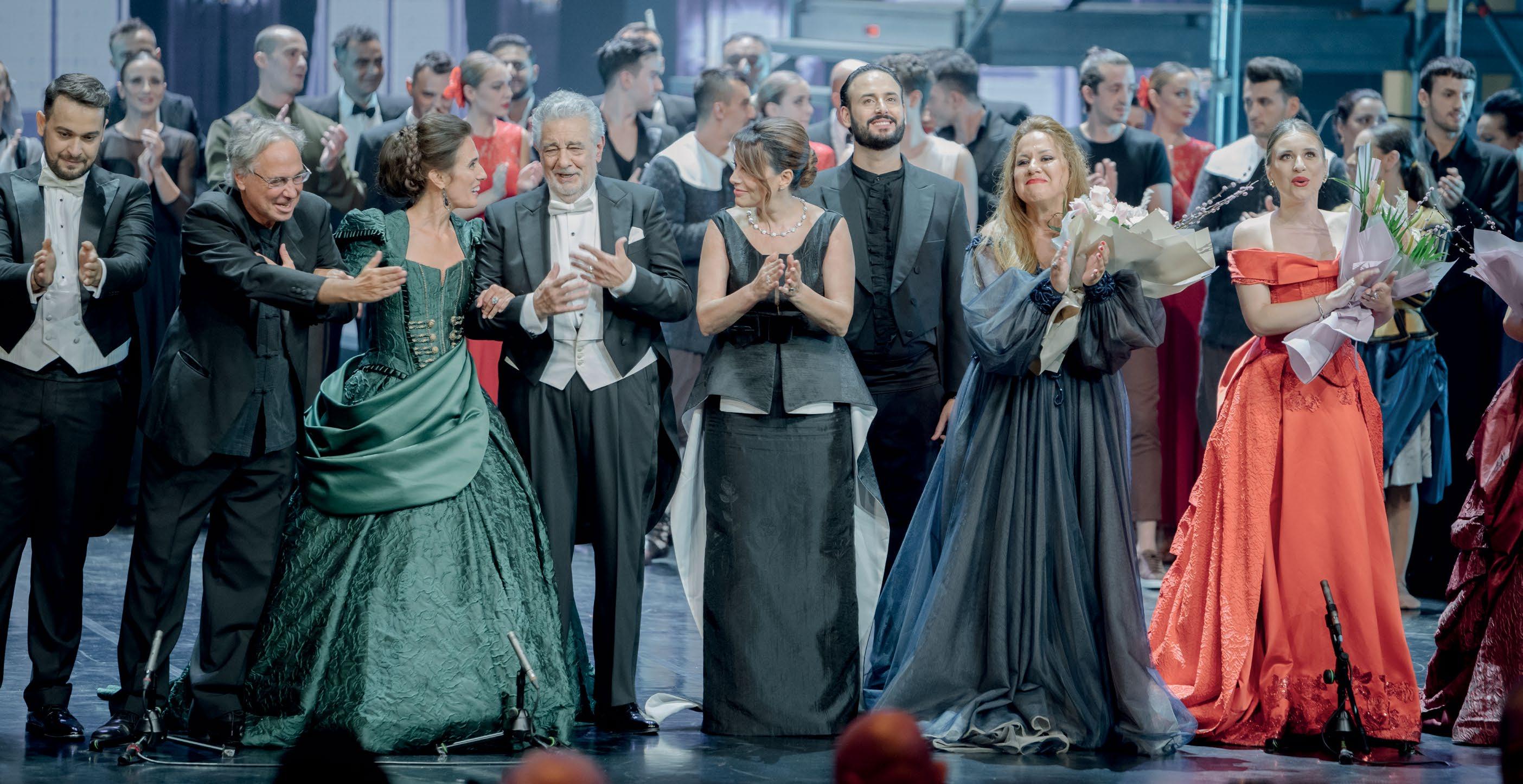
Foreign Culture Week will also fill in the gaps left by the opening of several restoration and reconstruction sites of cultural monuments.
The reconstruction of the National Theater of Opera and Ballet was the Albanian government’s single
Another important and ambitious project is the reconstruction of what used to be called “The Pyramid,” constructed in 1988 as a museum in honor of the dictator Enver Hoxha. This space will soon be converted into a very important center for technology and innovation for youth called TUMO. Very close to the University of Arts, a new National Cultural Center for Children will also be built. This brand new building will take up 8250 square meters and offer all the necessary resources for children to play, learn and develop their talents.
Many more cultural monuments are being restored, revitalized and reconstructed, especially those that suffered damages from the earthquake of November 2019. In the aftermath of the quake, around 55 cultural
Albania is undergoing a revitalization and restoration process that will bring back the past, while preserving the present for the future generations. Come and be part of our journey!

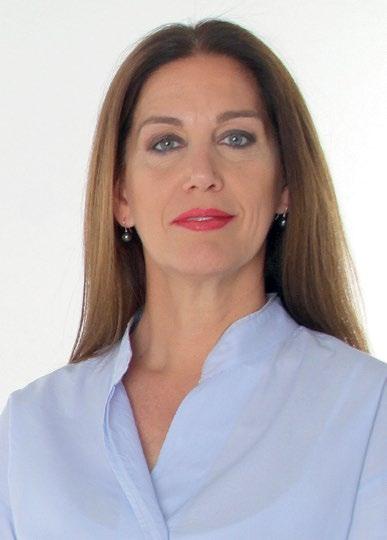
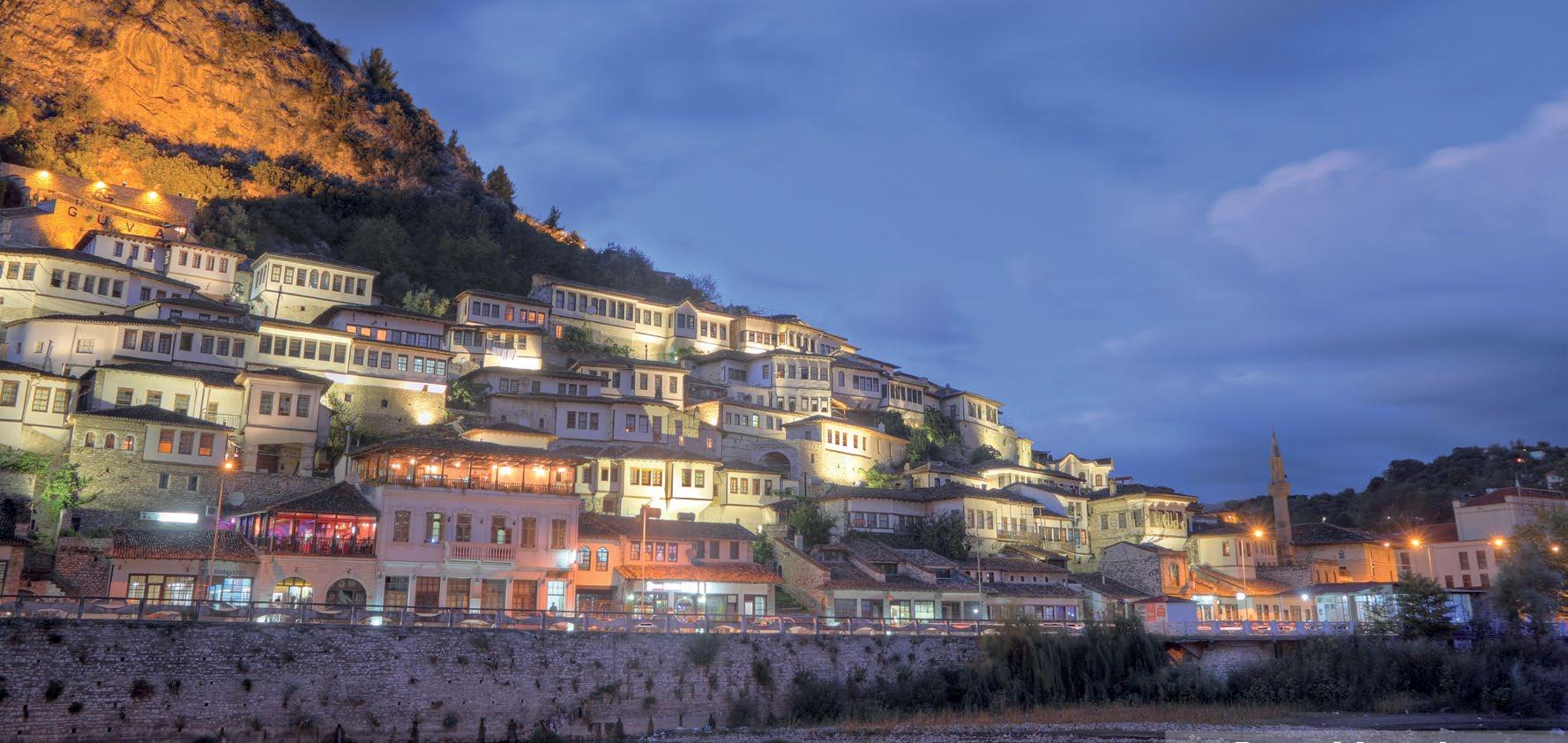
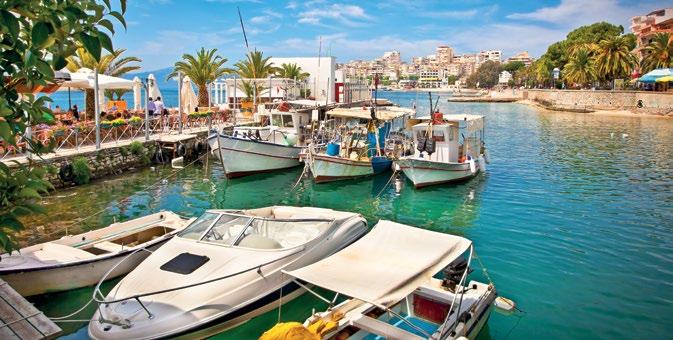
Situated in the western part of the Balkan Peninsula, Albania is one of Europe’s hidden gems. Boasting a 280-mile coastline of sandy beaches, rocky coves, and stunning lagoons, alongside the towering mountains and fairytale valleys of the Albanian Alps, now is the time to discover this land of beautiful contrasts.
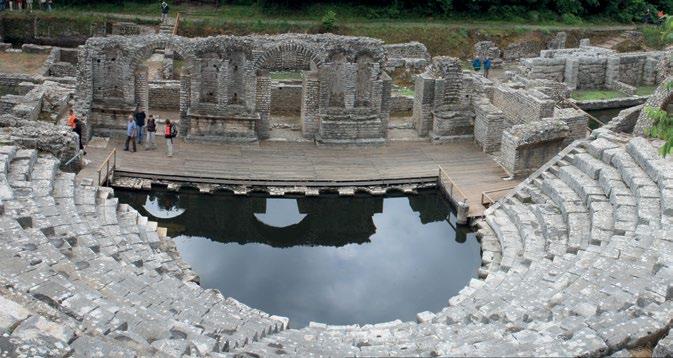
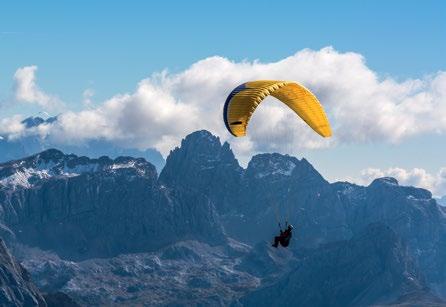
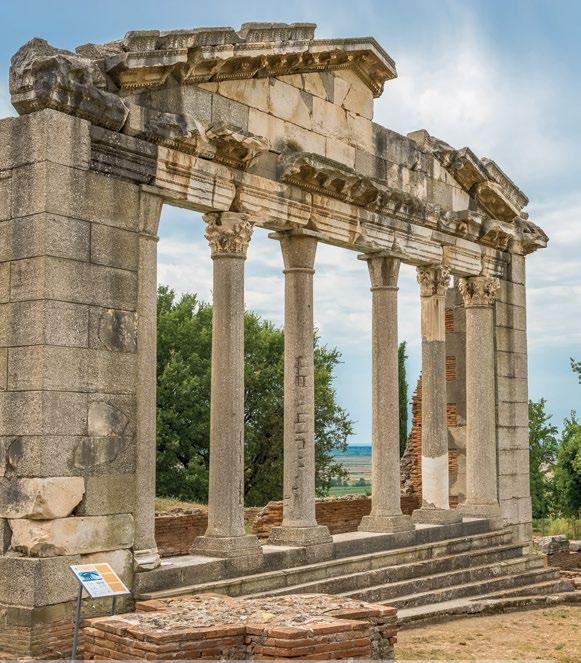
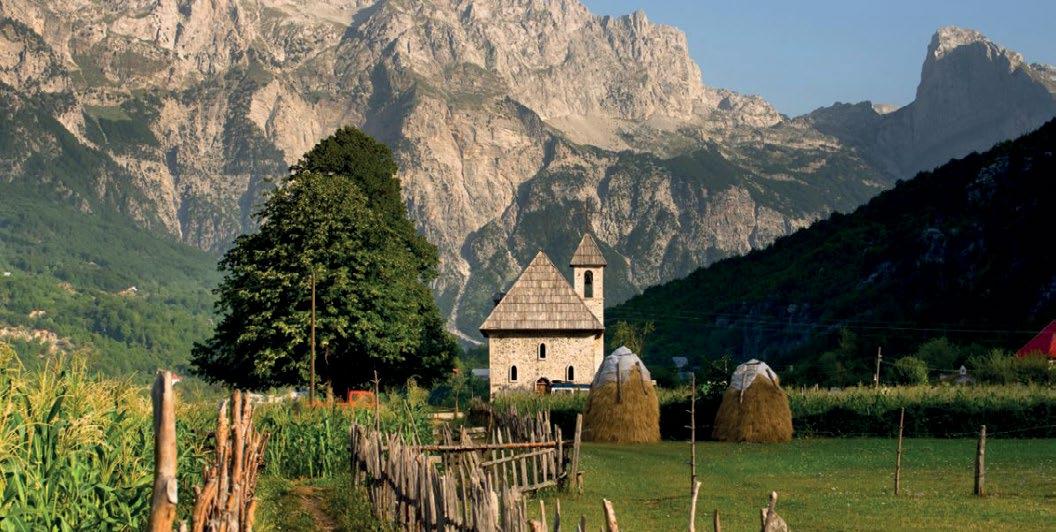
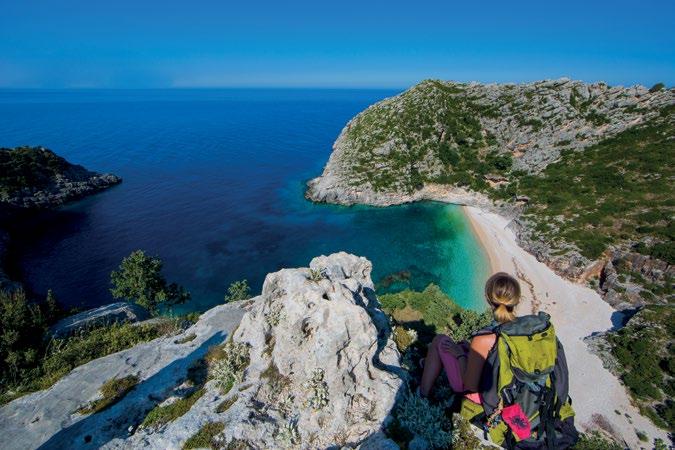
Founded in 2006, The European University of Tirana (UET) has established itself as one of Albania’s leading private higher education institutions. Accredited by international agencies including Germany’s CHE, the university has expanded beyond its initial focus on law and economics, introducing programs in engineering, computing and technical medicine. “Our studies are based on state-of-theart knowledge, but we also work closely with the business world,” explains Prof. Assoc. Dr Selami Xhepa, President of UET. “Students graduate from UET fully prepared for the demands of the labor market.”
Offering extensive exchange programs to other European universities for both faculty and students, UET prides itself on its international focus. “Most of our staff are from a young generation that got their PHDs at European universities,” says Xhepa. “Their international expertise is a real asset.”
With an extensive and expanding curriculum, and strong ties to business, the European University of Tirana targets the international market. www.uet.edu.al
“Albania will engage your body, your mind, your heart”
Mirela Kumbaro Furxhi, Minister of Tourism and Environment
Our studies are based on state-of-the-art knowledge
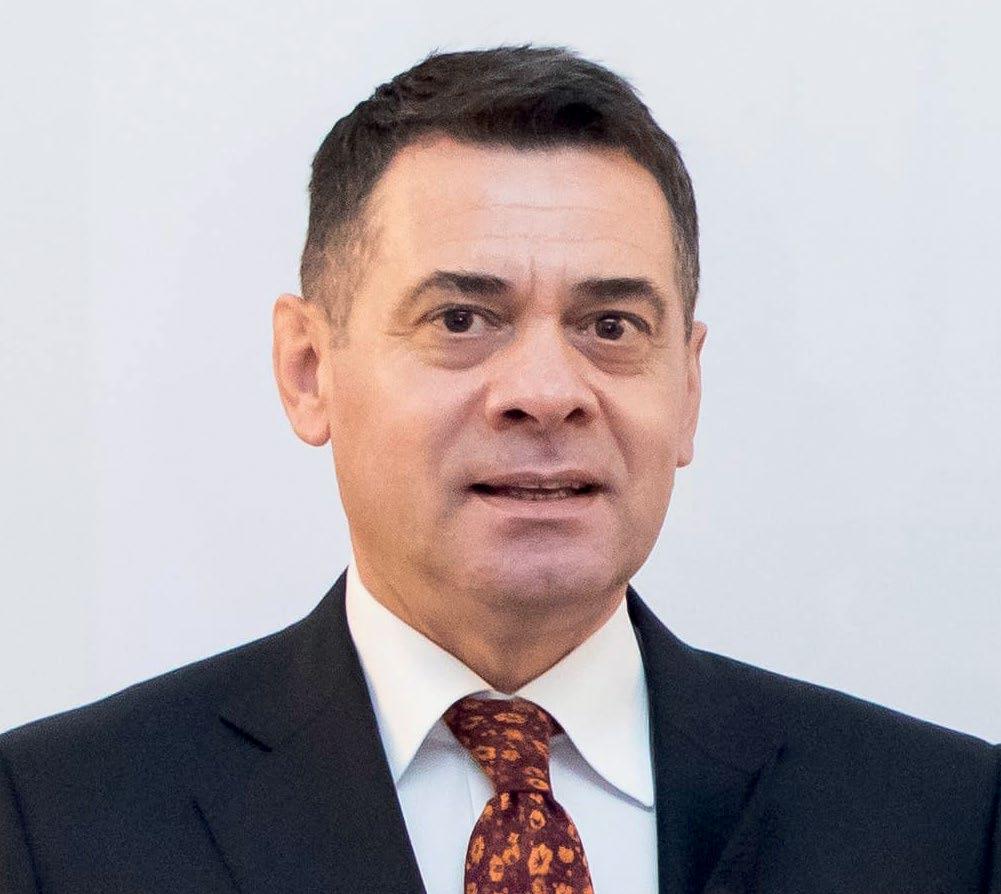
Albania has struggled through an earthquake, a pandemic, and now the effects of the Ukraine invasion. But the government of PM Edi Rama feels confident that it will pull through as it has to date, thanks to a program of widespread reforms that have diversified the economy and streamlined government and the justice system. With continuing support from longtime partners such as Germany, Albania is ready to attract even more FDI to a region that is safe, dynamic and filled with opportunities for investment.
Albania experienced an earthquake in November 2019, then the Covid pandemic broke out in 2020, and now there is a war in Europe. How is the country dealing with these crises?
It is unfortunately true that Albania has undergone three crises. The earthquake of 2019 was the worst in 45 years, directly affecting over 200,000 people in 11 municipalities. But the government was there for the people from day one, working on a unique reconstruction and social program that did not linger for years but was quite speedy and transparent, and which is doing the right thing by giving people back their homes and their hopes. Most families are back home and we’re erecting 167 schools and public buildings. By early autumn at the latest we will wipe out all the economic and architectural scars of the earthquake, if not the emotional ones. We were also able to secure a pledge in Brussels of more than €1.1 billion in aid to finance reconstruction. Around €300 million of that were grants, and this amount has already been contracted and committed to different reconstruction projects. The EU is the biggest donor, and Germany also offered around €12 million in support, so we are very thankful to former Chancellor Angela Merkel, to the federal government and to all the people of Germany who have been
close to us at our time of need. Then came the pandemic, although we have high hopes that it is fading away. The government has provided relief here as well through medical, public health and financial measures, offering packages to families and businesses. We began experiencing a V-shaped economic recovery. And then came the the invasion of Ukraine, whose consequences are felt heavily in Albania because our shock absorbers are not the same as those of developed countries. But this government is going to navigate it successfully as well. Last year we had economic growth was 7.6% and this year it is expected to be around 4% as the Ukraine war leaves a mark, although I cannot quantify precisely yet of course.
of Germany, Austria, Greece, Turkey, Italy feel that Albania is like a second home to them, whether they are here as investors, residents or tourists.
What has this government done to attract FDI?
Can foreign direct investment play a relevant role in Albania after all these years of crisis?
Yes, and I call on all the investors of Europe and beyond, to tell them that Albania and the region is a good place for investment from many points of view. Above all, it is far from any zone of potential conflicts; we have the added security of NATO membership, and Albania could be a safe haven for investors from all parts of the globe. And with the Open Balkan zone, which Prime Minister Edi Rama has pushed through the region, the Western Balkans have become an open economic space of over 20 million consumers, making Albania and the wider region more attractive than it used to be many years ago. So this is a region that is safe, that is growing economically, with a young population and a fantastic vibe of culture, tradition, economy, innovation and hospitality. If you do a survey here, you will find that citizens
This is a country that considers foreign direct investment as blood in its body, and we have taken many steps – procedural, legal, financial, fiscal – to attract FDI successfully. By the way, FDI in Albania is one of the highest in the region as a ratio to GDP. We have a very good package of incentives for energy, agriculture and tourism. We already have many German investors here. We also have Austrian investments in energy and information technology (IT). Three years ago, when I was Minister of Finance and Economy, I assisted Lufthansa to settle in the country through a merger and acquisition.
Some investors may still think of the Balkans as an area of potential conflict situated next to Albania. What would you say to them?
The Westerns Balkans is no longer an area of potential conflict, quite the opposite, it is an area of fantastic hospitality where regional actors have a very strong consolidated tradition of sitting at the table for discussion, and this joint work has consolidated the idea that we have no contradictory interests in our pursuit to become EU members. And there is a very consolidated lesson of knowing how to work
together. Albania, as a tourist destination, benefits very much from this unity, because we get a lot of visitors from North Macedonia, Serbia and Kosovo. As for visitors from northern Europe, we are fast reaching pre-crisis levels of above six million, which represents a strong injection to the economy and an improvement to the balance of payments at about €2.7 billion.
We are Europeans, and the EU is our natural home. Despite the lengthy procedures, the bureaucracy and the slow response times, our aspiration to become a member of the EU remains unshakable. Every time a poll asks this question, more than 86% of respondents say yes. Membership in the EU is really the key reform that will improve the life of Albanian citizens and of the region. We have done our homework, as recognized by the European Commission over four times. We have undertaken justice reform, fiscal consolidation, energy reform, human capital reform, public administration reform. And we are heading towards a very consolidated, non-partisan public administration thanks to these reforms. The bottleneck is in the attitude that is still missing among the members of the EU. Neither North Macedonia nor us deserve to be on the waiting list outside the door just because Bulgaria is using its veto power to stall the launch of membership talks with North Macedonia.
Deputy Prime Minister of Albania
”
We have undertaken justice reform, fiscal consolidation, energy reform, human capital reform, public administration reform.
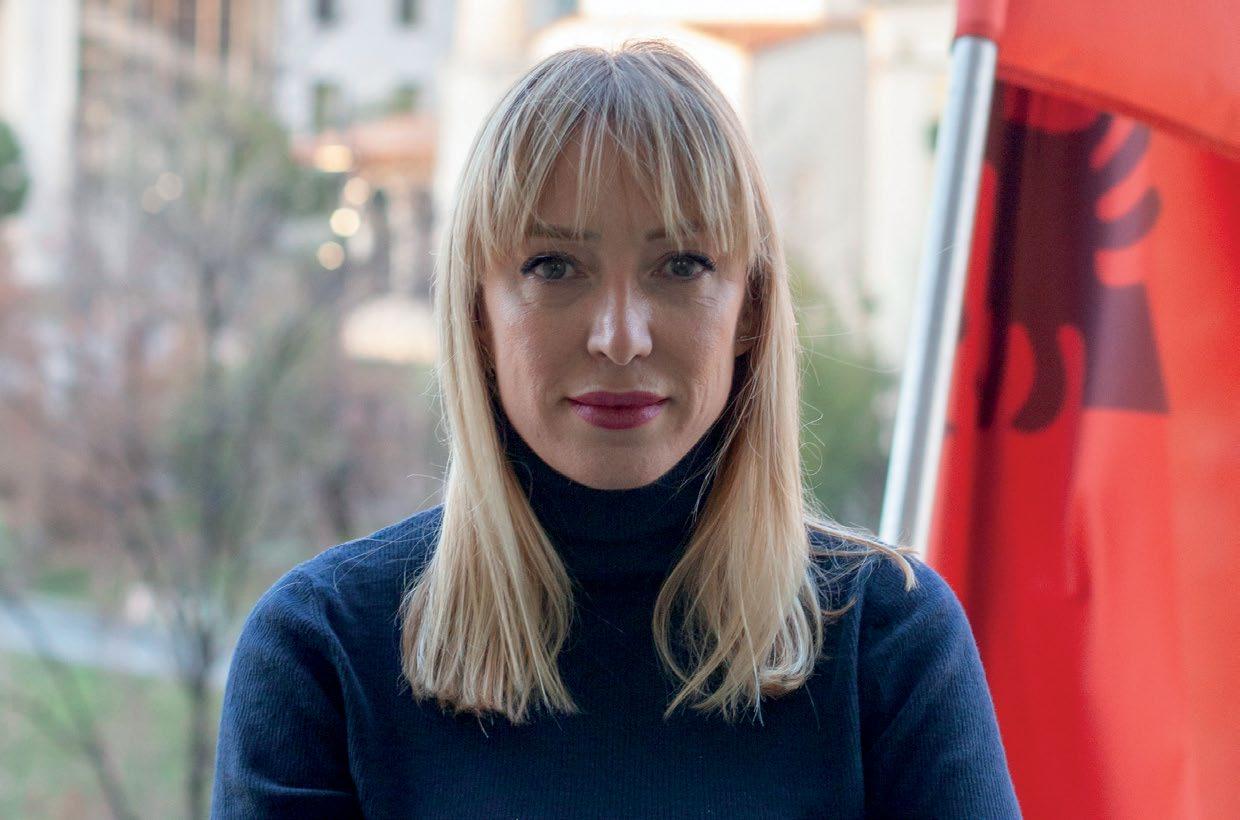 of Agriculture and Rural Development
of Agriculture and Rural Development
Albania’s agricultural sector is dominated by small holdings that continue to farm the traditional way. While growth is hampered by land fragmentation and a go-it-alone mentality among farmers stemming from the collective memory of communist times, the sector is also blessed with fertile land, plenty of water and a very low use of fertilizers, making it an ideal laboratory for the EU’s sustainability goals. The country is already a beneficiary of European funding for rural development, which is driving a boom in agrotourism. And with exports on an upward curve despite the current global upheaval, Albania keeps proving that it is ready to join the European club.
You took up the portfolio in September 2021. How would you assess the experience of heading such a crucial sector for Albania?
Agriculture and rural development is a major sector that affects a lot of people and a large portion of the country, so running it is a huge responsibility. Even though I had previously worked as head of the Agency for Agricultural and Rural Development, I could not have imagined the responsibility that comes with running a whole sector and creating a roadmap for its development. I was not in politics before this, so the reason I was chosen despite my lack of political affiliation is because the investment that took place at the agency under my leadership really did make a difference, and when the prime minister was visiting remote areas in the country, he heard about it and was convinced that I could do this job on a larger scale. Of course, as a minister the job is much harder, because I also have to change mindsets and convince farmers that working together creates more value for them. I spend a lot of time out in the field meeting farmers and talking to them, trying to understand their problems. It’s about inspiring them to
do something outside their comfort zone, to open up the windows of opportunities. If this is achieved, then my mission is done.
The primary goals are set by our main priorities, and these focus on increasing exports through more investment in the fruit and vegetable sector, medicinal plants, agroprocessing, and by adding value to products in-house in the value chain....We have translated this goal into numbers: $1 billion by 2030. We have a vision to achieve that and we are halfway there. The indicators for the first three months of 2022 support this goal: we experienced a $10 million increase in exports from last year despite the upheaval in Europe and the Serbian market shutting down. We also aim to achieve our goals through the diversification of products, so not just tomatoes and fruit but high export potential products that would be produced mainly in greenhouses.
in Albania, where the average size of farms is just 1.3 hectares. We also come from a communist regime that used to be structured around cooperatives and where the government made farmers work all day long in return for mediocre salaries. If you opposed the regime you would be sent to work in the cooperatives, so it was a type of slave work. This memory is embedded in the collective mind, so it does not come naturally to farmers to work as a cooperative which is the normal way to do agriculture in Europe. We can’t reach the level of production we need unless we all cooperate with each other. We can produce separately but we need to plan and sell and buy inputs together because that way we can exert more pressure and sell at better prices.
How competitive are Albanian products, and what are you exporting to the EU right now?
the EU, so that in itself means that they are reaching the required standards. But the ministry needs to do its job to negotiate with the EU, and that is why we need to open up talks so our administration can begin the job of adapting to all the rules and regulations in terms of the paperwork.
What is the unique contribution of Albania in the field of agriculture?
Albania is a very small country that cultivates a smaller agricultural area than some Länder in Germany. But we are a Mediterranean country and our production reflects this location. We can produce faster than other countries in a high quality environment with a very low use of fertilizers and where visitors are always surprised at how tasty everything is, and that is because our farmers are highly dedicated to the land.
This goal requires increasing and strengthening food security in all the steps of the process: on farms, transport, trade and so on. With support from the EU we are in the process of approximating the legal framework and creating procedures for food safety control. A huge focus will be the digitalization of agriculture so we can create traceability. This year we have allocated €4 million to digitalize services. We also face challenges as we strive to increase cooperation with wary farmers, compounded by the problem of land fragmentation
Our capacity to export and get certain products recognized is held back by problems with traceability. The reason we cannot export dairy products, for instance, is that we have not yet complied with requirements of EU standards. We do export fruit, vegetables, medicinal plants and aquaculture products, but we need to do better with a traceability system where all our food safety institutions will speak for each other. The problem of fragmentation plays a role here: over 80% of farmers have fewer than five cows, which means that for us to be able to acknowledge each and every one of them is very complicated, but we are working on it. If at the end of my term I can open up dairy exports, that would be a big success for me. Lufra is a major company that is financed by
What would be the effect of EU accession on the agricultural sector?
The Open Balkans experience showed me what needs to be done to prepare for the larger EU accession and all the additional paperwork to comply with their standards. We need to open negotiations right away so we can start that process. The most important job is done since we are already exporting a lot of products to the EU, which relies on us for a number of them. Albania has an advantage in the region because we can be in the market for fruit and vegetables two or three weeks before our neighbors. Plus, we have done a good job of allocating available European funding for agriculture, putting the infrastructure and processing capacity in place in order to reach the standards that the EU will require.
” We have a lot of good energy in Albania, and people are really ready to feel like they belong to Europe, because in their hearts they know that they do.
In April 2021, Edi Rama became the only prime minister of Albania to win three consecutive parliamentary elections. This has provided unprecedented stability to his government policies, including an ambitious program to create economic development, retain young talent and build an Albanian identity through culture. Minister Elva Margariti, who joined the Cabinet in 2019, details the numerous ongoing initiatives to restore landmark sites, promote cultural heritage, revitalize rural areas and get young generations involved in the process through innovative projects that are creating numerous jobs and investment opportunities.
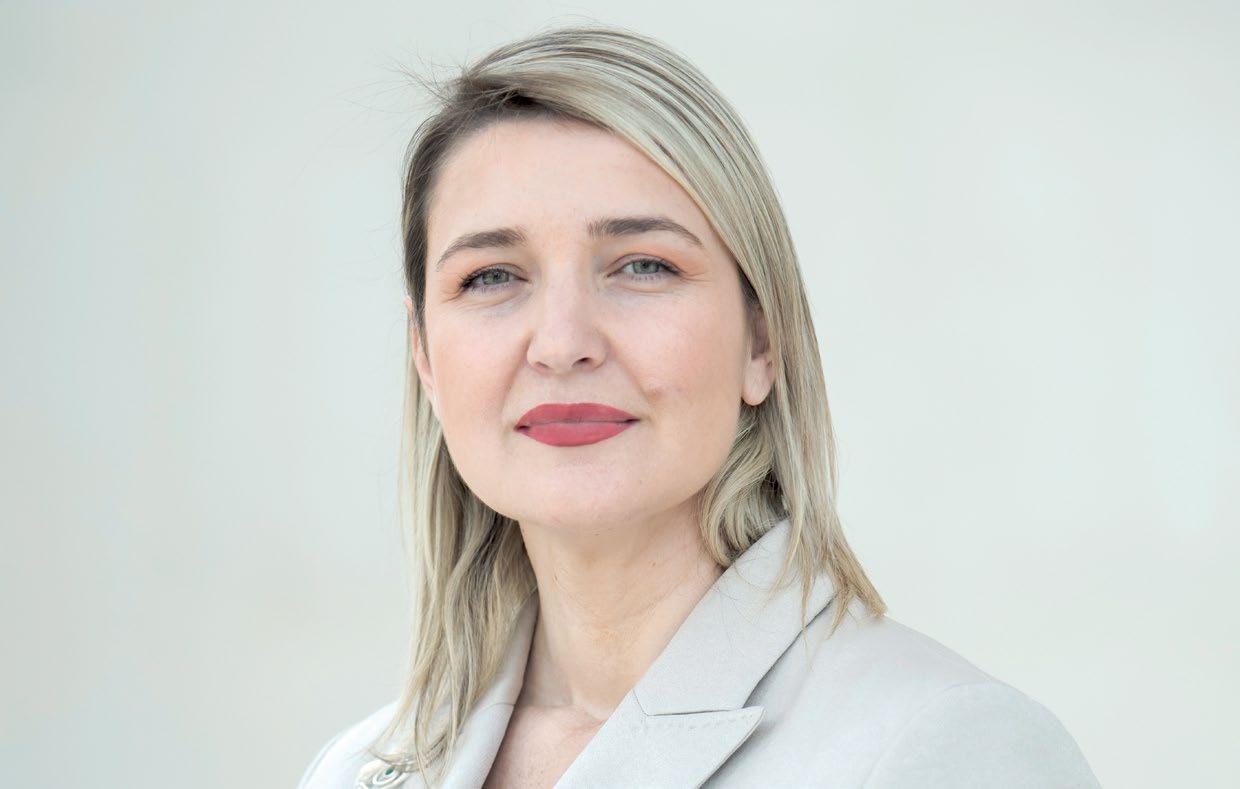
What are your priorities for Albania’s cultural sector in the near future?
It’s a great challenge for any political party to secure a third term in government, so expectations and demands are high. But on the other hand we are more focused and experienced than ever, and our priorities are clear: rebuilding and revitalizing the necessary infrastructure to promote Albania’s art and culture, and getting our children and youths engaged in this forward-looking process of building Albanian identity. We have a clear, long-term vision that is encapsulated in the slogan Albania 2030, we are investing in cultural industries and we are doing our best to present our vision with a cross-ministerial focus, especially to our young people.
Why is it so important to get Albania’s youth involved in cultural development?
One of our pillars is to merge together tourism and preservation, and we want to make the young generations part of this process by promoting our cultural heritage through technology and digitalization. We have passed a new law for startups and we see a huge potential
to merge together all the priorities of the government and direct new young talent to digitalization, understood not just as a process of archiving cultural heritage but also of economic development for our young generations. This ministry is paying particular attention to educational programs to make art and culture accessible to our young people, as well as to the required infrastructure, whether physical or not. In terms of physical infrastructure we are working on a dedicated new project, a national cultural center for children. But we are also driving other intangible projects such as the upcoming opera junior program, theater programs for youth, and new funds for young writers, composers and playwrights. So we are spreading out our potential across many fields.
merge together all the revitalization projects as a model to improve cultural tourism and to bring back a young generation to the sector. So after the earthquake we had a first phase of reconstruction and emergency projects that were conducted by the state, then we received a generous support of €40 million from the European Union and other donors like the US Embassy and the Prince Claus Fund. These buildings are important to us because they are part of our national identity, like Skanderbeg Castle in Krujë which was badly damaged, or the Durrës amphitheater. So it has been a challenging time, but we are completing reconstruction, partly in cooperation with the EU for Culture program.
boost the economic everyday life of our communities. Another important collaboration with the EU is at Byllis Archaeological Park, which has the largest number of mosaics in Albania, and which is receiving a generous €6 million support. And Tirana is European Youth Capital this year. So the field is full of new opportunities.
Are there any other significant initiatives to promote development through art and culture?
How did your department handle the double impact of the 2019 earthquake and the pandemic?
We already had a program in place for the restoration and revitalization of public spaces. During the pandemic we finished the reconstruction of the National Opera Theater, which had not undergone such work for more than 60 years, and we fully equipped it with new technology. The National Gallery of Fine Arts has been undergoing restoration since last year, and we are also reconstructing the University of Arts, which is an Italian building with the best concert hall for acoustics; this project is a big challenge because of the required technology. After the earthquake it became clear that besides restoring damaged heritage, we had to seize the opportunity to
Speaking of the EU, Albania is well on the path of accession with strong popular support. What benefits do you see for the cultural sector? Historically, culturally, geographically, linguistically, spiritually, Albania has always been European. Such cooperation would only bring us closer. Through the EU for Culture program we have already demonstrated the European standards of our professional teams and processes. The level of qualification of our projects is high, and we are adopting new European models of promoting our cultural heritage not just to foreign tourists but also to our own children.
Albania is part of the Creative Europe program, we have a big partnership with Unesco, and we had an agreement with the EU Commission to be part of a program to bring back ancient routes that cross three continents. This creates a possibility to share identities and common know-how, and it has the potential to
We are also working on Art in Public Spaces initiatives, which is not just about visual art installations but also about the urban revitalization of an area through art. This is a good opportunity to educate our youth in the beauty of space but also another way to support contemporary art, which needs a push in Albania. And there is another initiative with a diplomatic dimension: our International Culture Weeks, where we work with international partners to bring other cultures to Albania. It started in late April and we have a list of cooperating countries that include Germany. We want to bring people and businesses that can be connected to other people and businesses, in order to create networks.
We invite you to come discover Albania, this beautiful mosaic made of so many different colors and pieces. You cannot experience it by just hearing about it. Visit our beautiful natural spots, observe our religions living together, visits our castles. We have a lot of things to show you, but above all we are a warm and welcoming people. So come be part of the Albanian flavor in all its dimensions.
”
Besides restoring damaged heritage, we had to seize the opportunity to... improve cultural tourism and bring back a young generation to the sector.

Founded in 2018 in partnership with the award-winning Turkish Airlines, Air Albania began operating in 2019 with a single route to Istanbul and has quickly expanded to serve major European cities, including Düsseldorf. During the Covid pandemic the airline became much more than a flagship carrier, conducting repatriation flights and transporting life-saving vaccines that helped bring down national infection figures. Building on the strengths of a young and international workforce, the airline is poised to grow more than ever on the back of increased tourism and a steady flow of business travelers keen to explore Albania’s booming investment opportunities.
Albania celebrates 110 years of independence this year. As the national carrier, what are the values that Air Albania shares with the country?
We have a young, ambitious workforce with an average age of 27, and employees know that as members of the flag carrier, they are also representing the name of Albania in the eyes of the world. This is in line with what Prime Minister Edi Rama has been working to do – to bring hope to Albania’s youth, to make them want to stay in Albania and give them an opportunity to do something worthwhile with an Albanian company. We have a motto, Albanian Pride. It’s about doing things right. This country needs to be loved, and that’s what we’re trying to do.
You say Air Albania is a national carrier with an international outlook. What does this mean?
This is an international company. Turkish Airlines has a 49% stake and I myself am Turkish. We have our Albanians workers, all of whom speak several languages, and we have employees from many other countries including Thailand, Spain and Italy.
The working language in the company is English, and we are trying to preserve both an international atmosphere and a close, family feel. So we are a very colorful, diverse family, and we are trying to convey that we are a European-minded company that follows all the rules and highest standards of safety and quality.
During the pandemic, operations were limited by different national restrictions, but you also played a key role in repatriation efforts. How did you deal with these challenges?
Before the pandemic, we were carrying around 75,000 passengers on a quarterly basis, but with the pandemic operations ground to a halt. When the national restrictions went into effect, a lot of people needed to return home, both Albanians who were abroad and foreigners in Albania who needed to leave the country. Now if you call yourself a national carrier, you have responsibilities. So we gathered our operational people, gave instructions to the crews, and organized repatriation flights. We ended up carrying 17,000 people – 10,000 into Albania, 7,000 out of Albania. We also struck deals with other airlines to fly people from the United Kingdom to Albania. Before the pandemic, we were pushing to break into the commercial market, but with Covid we ended up performing a national duty by carrying people, cargo and medical supplies, including vaccines. We operated flights from Istanbul to carry vaccines back to Albania, and shortly after that infection numbers dropped significantly. So I like to say that we became a soft power of the country. There is a large Albanian diaspora abroad. How can you attract travelers
returning for family or leisure visits? The Albanian market is dependent on the diaspora, especially during summer and holidays. In late September 2019, for instance, we began routes to Italy to serve the diaspora of around one million Albanians living there. The most sensitive issue for the diaspora is the price of tickets, as they are people who work hard to send money back home to their families. So there is a lot of competition for that market, and we offer value for money, including a luggage allowance and a meal on board. We already have 15% of the market share, which is more than might have been expected.
International arrivals dropped dramatically in 2020 after years of growth, but they are bouncing back. What makes Albania attractive to tourists?
We have discovered a lot of potential not just in the diaspora, but in the growing numbers of people who want to discover Albania. Before the pandemic, many people from the Far East were already coming to visit us. Albania is a non-expensive, easygoing country with a sea coast and historic cities. It is an attractive country, and many people want to discover its culture. Europeans are also looking for holiday apartments to rent and buy, and this is attracting a lot of people, including Scandinavians and Germans.
Albania has changed a lot over the past decades. In the 1990s there was a communist regime, then a transition
to democracy. Albania is also a place with geographical advantages. It is interesting for investors because of these elements, and also because of the attitude by the government, which is working towards sustainability. This is Rama’s third term in office as an elected leader, which provides the kind of stability that investors are looking for. Looking at the country’s makeup, 65% of the population is Muslim and 25% is Christian, and you do not see any clash between both faiths. And you can see the growth in investment. Since 2018 I have witnessed a lot of development, big projects going on, hotels being built. The face of Tirana is changing. All this is bringing a new type of business traveler who wants to explore the country’s potential.
What are your expectations for the EU accession process, and how will it affect your company?
Albania deserves to be a member of Europe. The EU needs to be selective about its new members, but Albanians want it and are they are ready for it. If that happened, we would become a European carrier. We are already a Third Country Operator in the eyes of the European Union Aviation Safety Agency, because we comply with their regulations and are allowed to operate flights to the EU. What we are not yet allowed to do is to fly to a European country, then from there to another European country. As a European carrier, we would be allowed to operate such flights. Demand would rise and it would be a game changer for us.
” We are a European-minded company that follows all the rules and highest standards of safety and quality.
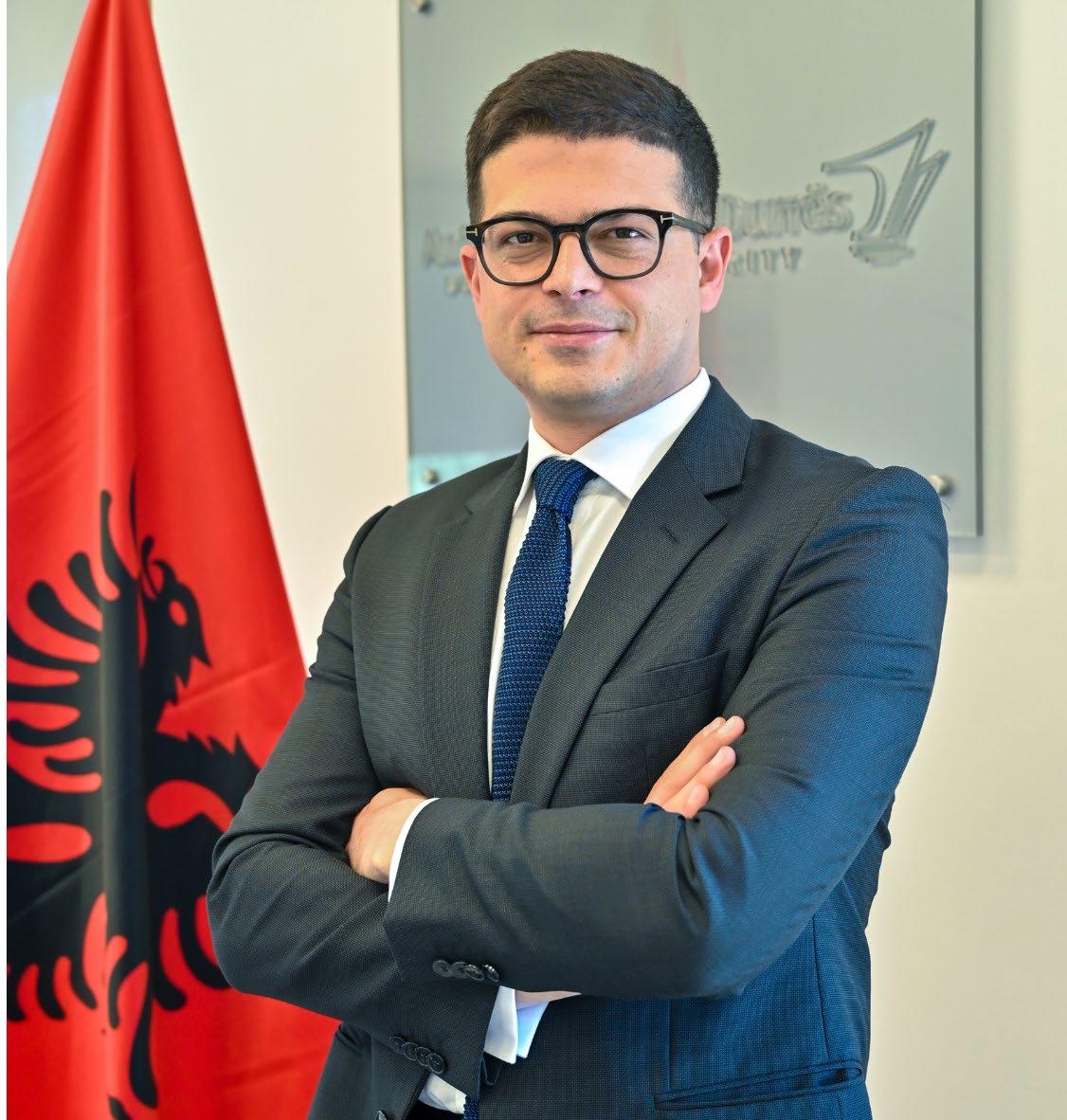
The port of Durrës is the largest port complex in Albania, representing over 90% of the country’s maritime trade and playing a large role in its connectivity to the rest of the European continent. As part of the government’s ambitious infrastructure plans, the facility is undertaking two simultaneous projects – one to relocate the cargo activity outside the city, and another to redevelop the city harbor into a luxury marina with high-end services. Several international firms have already signed on, acknowledging the fact that Albania has changed in the past decade and can now deliver sustainable projects that meet all international standards. Port Authority chief Mr Pirro Vengu discussed the numerous opportunities for investment that remain open.
Can you give us an overview of the port of Durrës and its importance for Albania?
The Durrës-Porto Romano port complex represents over 90% of Albania’s maritime throughput and almost 60% of its customs revenue. Although we are middle-sized by European standards, this is a multipurpose port that processes all types of cargo, including ferries that have established lines, mainly with the Italian coastal cities of Ancona and Bari, where we provide daily service.
The Port of Durrës is essentially also the port of Kosovo, as one third of our cargo is in transit to and from Kosovo in a phenomenon that has really taken off in the last five years. North Macedonia is also becoming a client of the port, which keeps growing. We have had a 48% increase in revenue and 10% growth in trade volume since 2019. This is due to the fact that we are signing better contracts for the operation of our assets, allowing us to have more funds to invest in infrastructure, whilst keeping very competitive tariffs.
The facility is undergoing important developments: in 2020 the Government of Albania approved an ambitious strategy for maritime transport that includes a solid investment plan to beef up Albania’s port infrastructure. Our strategy foresees the relocation of cargo activity outside of urban areas and the redevelopment of city harbors into luxury marinas for cruise ships and high-end tourism services. What Barcelona started doing decades ago, or Tallinn is doing now, that is precisely what we are envisioning for Durrës and Vlorë. As head of the Durrës Port Authority, most of my days are spent implementing the government’s strategy on these two components – relocating the cargo facilities and redeveloping the city harbor. Our guiding vision is to develop a world-class, technologically advanced and efficient, deep-water green port that will handle the projected future seaborne cargo for Albania and the wider region.
How are you going about the relocation of the cargo activities?
We are planning to build a new port facility 10 km from the current harbor
in the bay of Porto Romano. We have already approved the master plan and the financial feasibility and are now finalizing the environmental impact assessment and the detailed design. For the design component, we had a very competitive international tender and were lucky to receive 14 proposals, out of which we shortlisted five big international engineering firms, and the winner was Royal HaskoningDHV, a major Dutch firm that is leading the consortium. As we finalize the detailed design, we are working closely with our Ministry of Infrastructure and Energy on project financing and subsequent international tendering procedure, in accordance with IFI standards, with the aim to begin construction in 2023. The key transition in our business model is that we don’t want to remain just a cargo port anymore, we want to become a logistics port, a hub for handling transit cargoes for adjacent countries, with the attractiveness of a dedicated economic zone that can support production activities that import, produce and export within the port facilities. Albania has the scope to diversify its trade portfolio through these logistic platforms that have proven successful in Hanseatic Europe and could become attractive for export bound industries in the Adriatic-Ionian region.
The second component involves redeveloping the city harbor. In 2020, a cooperation agreement was signed between Albania and the United Arab Emirates focusing on key projects of bilateral cooperation, and the Durrës city harbor was something that both governments were keen to work on. We have a master plan and are currently in talks with a leading Emirati firm, exploring the possibility of a joint venture. There will be a very progressive relocation, so as not to disrupt any operations, and ensure parallel progress on both development projects so as to minimize costs.
Albania is a country that deserves to have a more relevant place on the maritime transport regional map. There has been consistent investment by the government in key road, rail and air infrastructures that are key to ensure intermodal transport for any decent European port. Furthermore, Albania is pursuing an ambitious regional cooperation agenda where infrastructure connectivity is on top of the list. There are positive developments right now regarding rail infrastructure with Kosovo and road infrastructure that connects us to
” The integrated Port of Durrës - Porto Romano will become the centre of logistics and port-related commercial activities in Albania and has the potential to become the gateway to the Western Balkans. The development of the port offers a great opportunity for Albania in terms of national and regional market connectivity and socioeconomic growth.
North Macedonia. These are part of our region’s collective efforts to have the EU review its core Trans-European Transport Network (TEN-T) for goods and passengers. Until recently, the Western Balkans were not part of the core nodes of that network map, but there is a growing consensus that they should be, thereby opening up international financing for those projects. It is important to understand that, in contrast to a decade ago, Albania is now able to plan, finance and deliver international-standard level projects. We have a clear strategy, and we are doing things by the book. That is why we had so many participants in our design tender. It’s the same with key energy infrastructure, which is attracting big US and EU companies to Albania.
How did the Covid pandemic affect operations?
Our experience was pretty consistent with that of all ports in Europe. During Covid and in its aftermath we had growth of container and bulk cargo, but reduced passenger traffic because of the situation in Italy in 2020. The ferry business picked up again in 2021 and is steadily improving this year as well. And since we increasingly service Kosovo, that is a way for us to be better positioned at the regional level. We have the potential to service southern Serbia, and North Macedonia to a greater extent than we are doing now.
How much cooperation is there now between the Port of Durrës and EU ports?
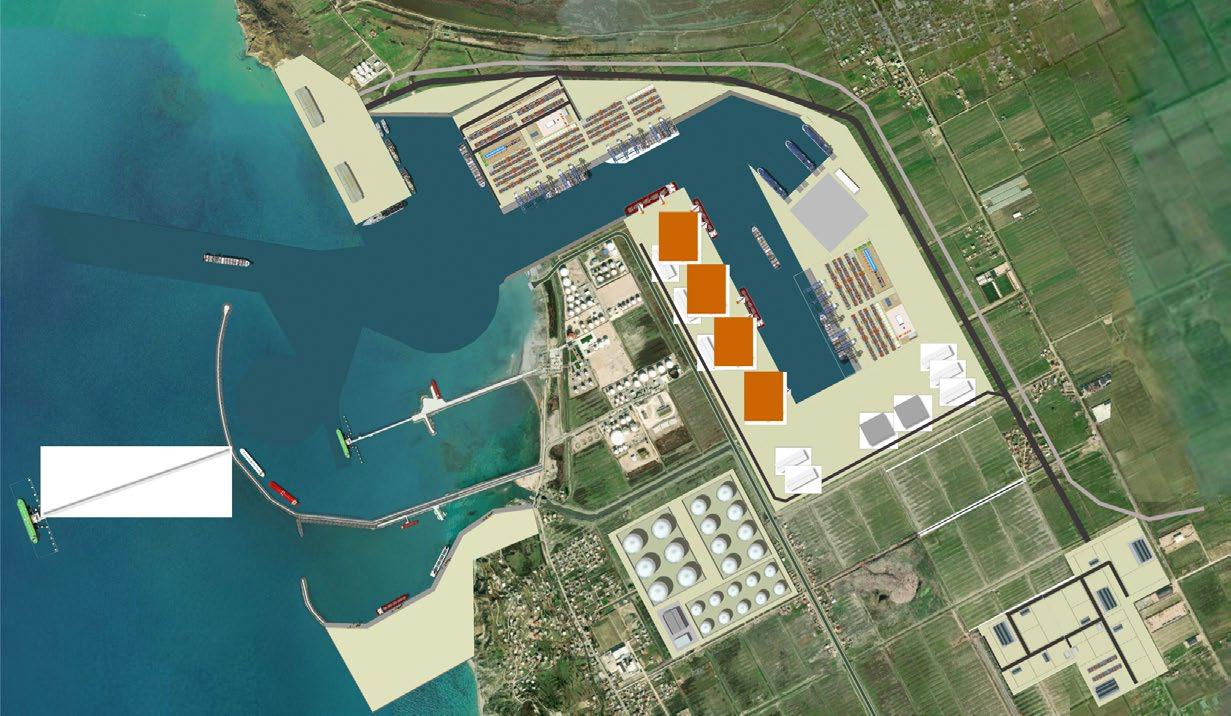
We have an established and quite effective cooperation with main Northern European ports, including Antwerp-Bruges, Hamburg, Rotterdam
and, as of late, with Le Havre. We are trying to strengthen our cooperation with them within the European Sea Ports Association (ESPO), of which we have been a member since last year. ESPO is the leading voice for sea ports in Brussels. European regulations on ports are very sensitive issues, as ports are seen as sovereign tools in whose infrastructure the national governments invest. Indeed, ports need very capital-intensive investment support. As we make progress in terms of investments but also with regard to the standardization of port and maritime services, in line with EU acquis, we have been lucky to count amongst our supporters the Regional Transport Community Permanent Secretariat, a joint EU and Western Balkans regional cooperation body, with the aim to achieve better transport connectivity amongst the countries of the region and the EU as a whole.
What role does the Port of Durrës play in education and training?
We clearly feel that we have a responsibility in terms of capacity building, training and licensing of certain port and maritime professionals. One year ago, together with our Ministry of Infrastructure and Energy and the University of Durres, we established the Center of Excellence for Maritime Affairs (CEMA), our capacity building and international cooperation arm, which is dedicated to training our staff, offering certified qualifications and also attracting young talent to the port administration. Albania has a few universities that offer training and education on maritime transport. But we realized that the whole industry was demanding a more tai-
lored approach to their needs. One year later, through CEMA, we have offered nine scholarships, certified 40 crane operators, trained dozens of our staff in environmental management, energy efficiency, IT, port security and safety of operations. We also have launched this year a paid long-term professional internship program for graduates and we are planning to finance a PhD in economics and maritime affairs at the University of Durrës.
What are the opportunities for Germany to participate in your projects?
Two of our terminal operators are German companies and they are part of our growth. A more recent example is the airport of Munich, which is one of the shareholders of the upcoming airport of Vlorë. There are opportunities for German companies everywhere, as Albania is investing heavily in renewables and in road, railway, sea port and airport infrastructure.
How do you think EU accession would impact the ease of doing business and the investment climate?
If you look at other EU accessions in eastern Europe, you see that there was economic growth because the accession process is also an ex-
ercise in implementing economic rule of law. We wanted to become a member of ESPO not only because they are the strongest lobbying force in Brussels, but also because they are a key enforcer of standard procedures. The Albanian Government and all the entities that are part of the EU accession process believe that it is a key rule of law exercise. For us it is also a key instrument for regional stabilization and cooperation because it provides a clear regional agenda for everyone. But the current geopolitical situation and lack of consensus within the EU on the speed and scope of the enlargement process has understandably created some frustration in the region. Ten years ago, we could neither design nor implement sustainable investments in energy and infrastructure. Now we can! Albania has clear strategies, knowhow and projects that benefit not only Adriatic Europe but the EU as a geo-economic union. Even more so in the aftermath of the war in Ukraine, we feel it is high time that the EU acts upon this new reality.
You represent a young generation that embodies the modern Albania. How are you using your leadership to foment change?
In our work as a team in the Port Authority we try to combine experience and passion. During the transition from communism, Albania lacked expertise and standards. This is a normal pattern. As we come closer to the EU, companies like ours that manage and develop key assets also have the social responsibility to implement investments that create jobs and provide the tools for a sustainable career path for young Albanians. Hence our focus on capacity building and the standardization of services. Both our main development projects are expected to create job opportunities by the thousands. That is our daily challenge, to deliver on the government’s priorities to transform our current facilities into a logistic port that is critical for Albania's market connectivity, competitiveness and socio-economic growth. And, to answer your question, this is also the key challenge for our generation: to be able to bring things up to standard very fast whilst helping the country deliver on investments and economic growth.
”
Kika Construction was founded 20 years ago and the company’s development since then has focused on excellent building quality and customer satisfaction. Supported by the values of “honesty, correctness and quality”, the company has brought European standards to the industry in Albania, working with German, Austrian and Italian partners. Here, Kika Construction’s owner, Avenir Kika, looks back on his career, takes stock of the German influence on his business and his country, and assesses the potential benefits and opportunities of EU accession.
Albania celebrates 110 years of independence this year and Kika Construction is celebrating 20 years in business. What are the values and characteristics that Kika Construction shares with Albania?
Right after the communist regime fell in the 1990s, land and properties that had been confiscated were given back to their legal owners. We were a big family of landowners in Tirana and so we got back our properties and land in the city. They were properties that had been accumulated over centuries by the old families of Albania. So that was the basis and the beginning of our activities. We started in agriculture and then developed into a construction company. Our values as a construction company are based on honesty, correctness and quality, which are values that are shared with the Albanian people and especially the people of Tirana. We strive to survive, develop and grow, just like Albania over the centuries. We share our values with our people and with our country. They are values that are not currently well known in the EU, but I hope that with Albania’s accession to the EU, the EU will think increasingly positively about the Albanian people and Albania as a country.
The Prime Minister has a strong vision for Albania to join the European Union. In practical terms, what would it mean for Albania to formally join the European Union? A lot of companies are already ahead of the pack and operating according to the EU standards, but what would it mean for the country, for the construction industry and for your company in particular?
I believe EU integration would be a major advance for our business, removing imports and customs fees, lowering shipping prices and enlarging the market we can cater to. Now, our residential buildings and offices in Tirana are being bought by Germans, British people and Italians, and we are successful with the standards that the EU has today. Right now, we know we are a small country and a small business compared with German businesses, but in Albania we have an expression, which is “to be as correct as a German”. That means that we have to learn German correctness and the German attitude. Did you know that 90% of cars in Albania are German? So when Albanians have money to buy a car, they choose a German one.
architects and Albanian engineers, built the first cantilever building in Albania. It was a very beautiful thing. Now, the central offices of Raiffaisen Bank are situated in that cantilever building. That made us proud of our growth as a company.
Another moment was when we collaborated with German and Austrian companies and created some residential buildings in Tirana that provide the same level of living as in Germany and Austria. Everything was done through close collaboration with German and Austrian companies.
people and we try to bring German and Austrian engineers here to teach us how to work like in Germany.
What do you think attracts German, Austrian and other European partners to Kika Construction, in terms of synergies and competitive advantages? In addition to your dedication to quality and track record, are there any other characteristics that make Kika Construction a good partner for European companies?
You are a family business with 20 years of experience, focusing on good quality, direct relationships and client satisfaction. Please tell us about your proudest moments at the helm of Kika Construction and the company’s most significant milestones.
There are many moments and many milestones. The first was in 2012, when we, with German steel, Italian
I would like to mention my partners in Germany, such as Roplasto for doors and windows. We have built around 40,000 square metres of windows and doors together. There is Roplasto, Deflex, Paschal, Doka and Skidata in Austria. Those companies have not only given us technology, but we have also trained our workers in Germany and Austria. That was a key moment in our success, because it means our workers do not need to emigrate outside Albania. They work here like in Germany and Austria and our construction standards at the moment are the same as German and Austrian standards. That is a source of pride for us and for Albania.
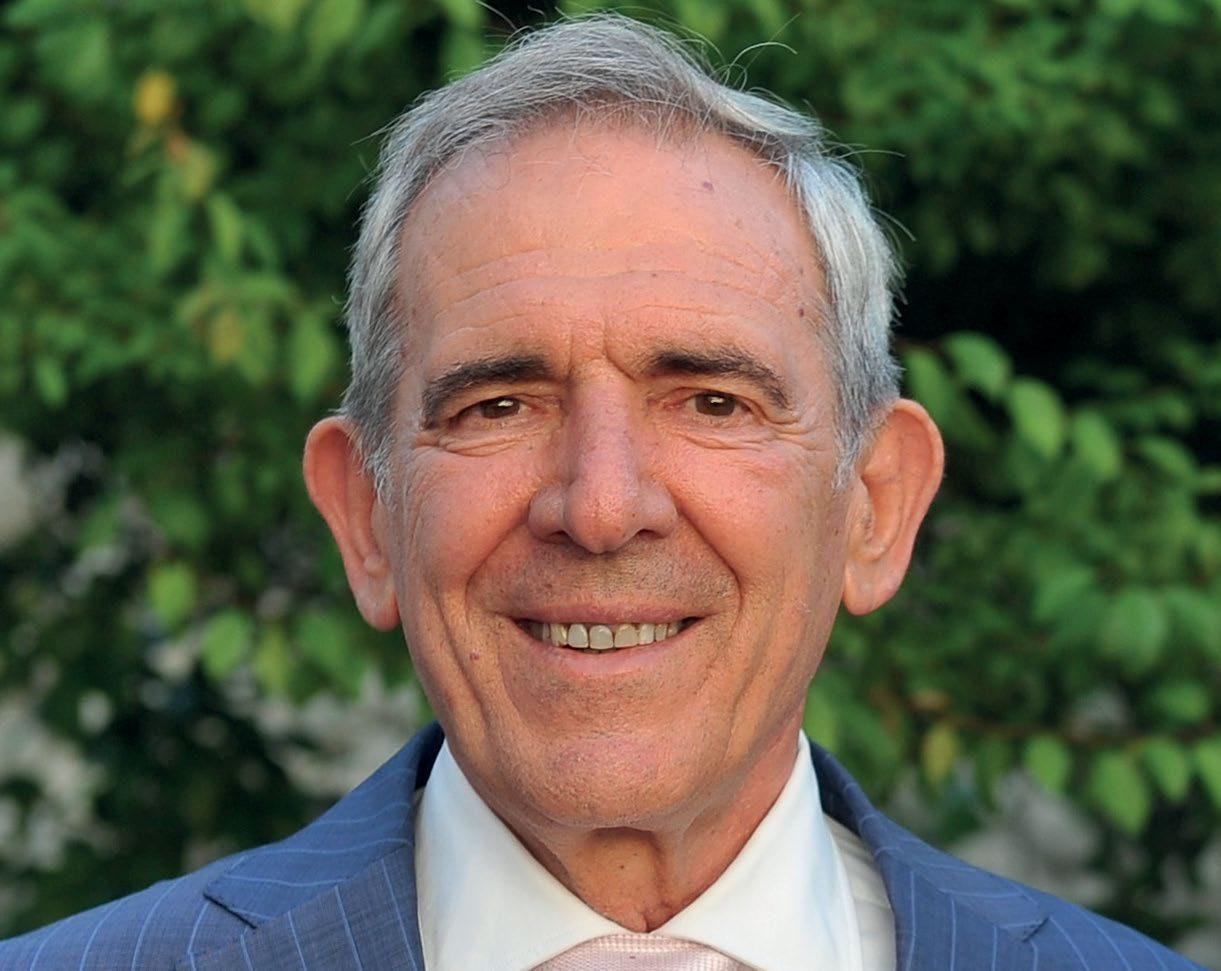
One example is how we decided to collaborate with Roplasto. We bought a small factory for producing Roplasto windows and doors and we now produce in the same way as in Germany. We train people in Germany and German specialists and engineers have also been here in Albania. For every new technology, we train
Yes, I think we are a good partner for all German and Austrian companies, not only in Albania but even regionally. So when they need to send German technology to the region, they come to us and we go together to explain and carry out some training there. I think we are good partners for German and Austrian business, but we have more to learn from them. Frankly, we have so much to learn from the Germans.
We currently have both finished and unfinished projects. Then, for the near future, we have to build a big sports area in Tirana. We are designing it now and we aim to co-operate with German businesses, German technologies and Italian architects. I think that it will be a success because people need more and more sports areas for training and living healthier lives. We are currently in the design phase and will begin as soon as possible, maybe at the end of the year.
” Our values as a construction company are based on honesty, correctness and quality, which are values that are shared with the Albanian people.
How has Rejsi Farma handled the Covid pandemic?
I think that we all would agree that the whole world was found unprepared against Covid-19 and with the pandemic it caused. We knew so little if not nothing at all about this ‘invisible enemy’.
Fear and panic were spread around Albania, as I believe in every other country because number of the deaths was increasing daily. In my opinion , our government has done a great job , by managing and monitoring the situation. Also, it was a great achievement of the government to secure Vaccine supply directly from Pfizer & Modena, at a time where no every country could manage it , since there was a shortage of supply and a high demand. The supply agreement of Vaccines , was from the State and the pharmaceutical company , therefore Rejsi farma did not play any role in this, however we are very proud of our government & our partner AstraZeneca that achieved the supply deal, which saved Albanian lives.
During the pandemic, Rejsi Farma instructed also by its partners , applied the rule of ‘working from home’ for all the employees that could avoid coming to offices, and also applied all the regulations anti-covid in the company.
Moreover during the pandemic, Rejsi farma together with German partners like Fresenius Kabi, a healthcare company specializing in products for critically and chronically ill patients, were able to supply hospitals with high-quality products. Also with Denk Pharma, a German company with high quality generic products, supplying us with levofloxacin injections, which are very important to treat hospital patients with serious bacterial infections.
Who would be an ideal investor or partner?
Since our company has been founded, the role models for us are Western companies. Essentially, any quality Western company with an interest in our market could be a suitable partner for us because we ourselves are built on a Western vision and
standards, and we share a common approach of conducting business.
Since 2018 we have invested in human resources, logistics, regional expansion, the pharmacy chain, e-commerce, professional healthcare consultation and infrastructure modernization. Of these, regional expansion is our priority right now because we want to serve not only Albania but the wider region. We have started to create a structure to be present in neighboring countries such as Kosovo,Northen Republic of Macedonia, and Montenegro.
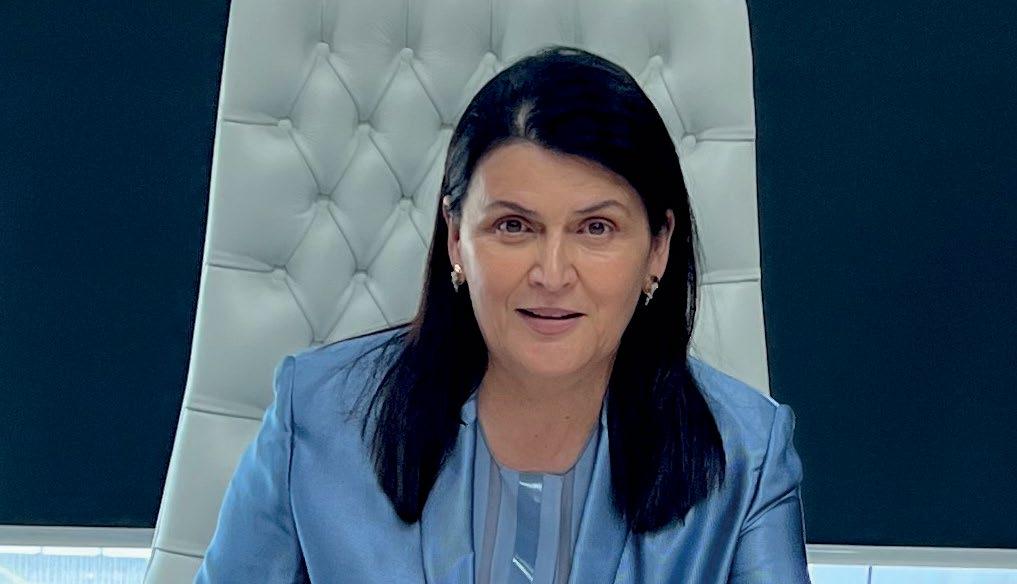
would say that there is a bond between Albanians with EU community, because of shared mentality, values and culture.
I strongly believe that now Albania is on the right path to enter EU family, and personally I would see a positive decisión by EU, to be very fair. All of us are very much looking forward for an acceptance into EU.
As for Rejsi Farma, I am proud to say that our company has implemented EU Standards since the very beginning of our history, due to our EU partners regulations , which I am personally very thankful to them.
and indeed would give our company more opportunities to do business with them. We are very much looking forward for that outcome.
What are your plans for an e-commerce operation?
How would these partners benefit from your decades-long expertise?
Among the services such as distribution,regulatory affairs,logistics,pharmacovigilance,more importantly Rejsi farma offer to its partners , stability,long term fruitful collaboration & loyalty. All of the services mentioned above are in line with EU guidelines & with compliance.
Prime Minister Edi Rama said in early 2022 that Albania would “never give up on Europe and on the EU, whatever the shape of the EU in the future”. With key EU accession talks expected to begin this year, please tell us about RejsiFarma’s relationship with European standards. Also, what would EU accession mean for RejsiFarma?
In my opinion Albanians have always been part of EU with the heart and with the mind but indeed EU has certain standards which must be fulfilled, and this had to take some time, considering Albania as post-communist country. (Totally isolated from the rest of the word for decades). I
Thanks to our partners, Rejsi farma not only has implemented the EU standards required, but also, we learned and we were trained to conduct the business with integrity and in line with Code of conduct. Therefore, today I am proud to say that Rejsi Farma is absolutely ready to operate in an EU environment.
In a recent press conference about German and Albanian relations, Prime Minister Rama stated that “our bilateral ties are absolutely excellent”. How do you see yourselves engaging with Germany, its organisations and private sector in future, whether through distribution agreements, knowledge exchange or best practice?
My opinion is,that Germany has always been considered as role model country for all of us in Albania. Albanian perception for Germany is very positive, and always use it as standard reference, for the matters we need to improve. Also, in my personal experience doing business with German people I always have had a positive opinion and learned a lot. If Albanian enters EU in near future, it would open more doors for German companies to enter Albania,
E-commerce has been booming for years but during the pandemic people were even more immersed online and we saw a need for it. We want to be part of this business and help make patients’ lives easier. We were in touch with very professional people from Spain and the project should be launched in May-June. This will help the pharmacy chain as well because it will be synchronized with e-commerce, so that a sick or elderly person can use this platform and have the products delivered to their home. It is expected to be a very modernized platform and we believe that would be welcomed by Albanian citizens.
You currently have a turnover of €35 million, up from €31 million in 2018. What is your forecast with the new projects?
With expansion and alliances into neighboring countries, turnover should increase significantly as new markets means more sales. And because these are small markets, we are a one-stop shop for big pharmaceuticals that will need to fill out less paperwork.
Are you ready in terms of human resources and talent?
We have been in touch with universities, as we want to have the best talent involved in our company and we want young people to stay in Albania. I will be happy if new generations stay and invest here, as we have very intelligent & professional new generations, and we must create the conditions for them to stay here.
Where has the company been investing
” Rejsi Farma offers to its partners stability, long term fruitful collaboration & loyalty.
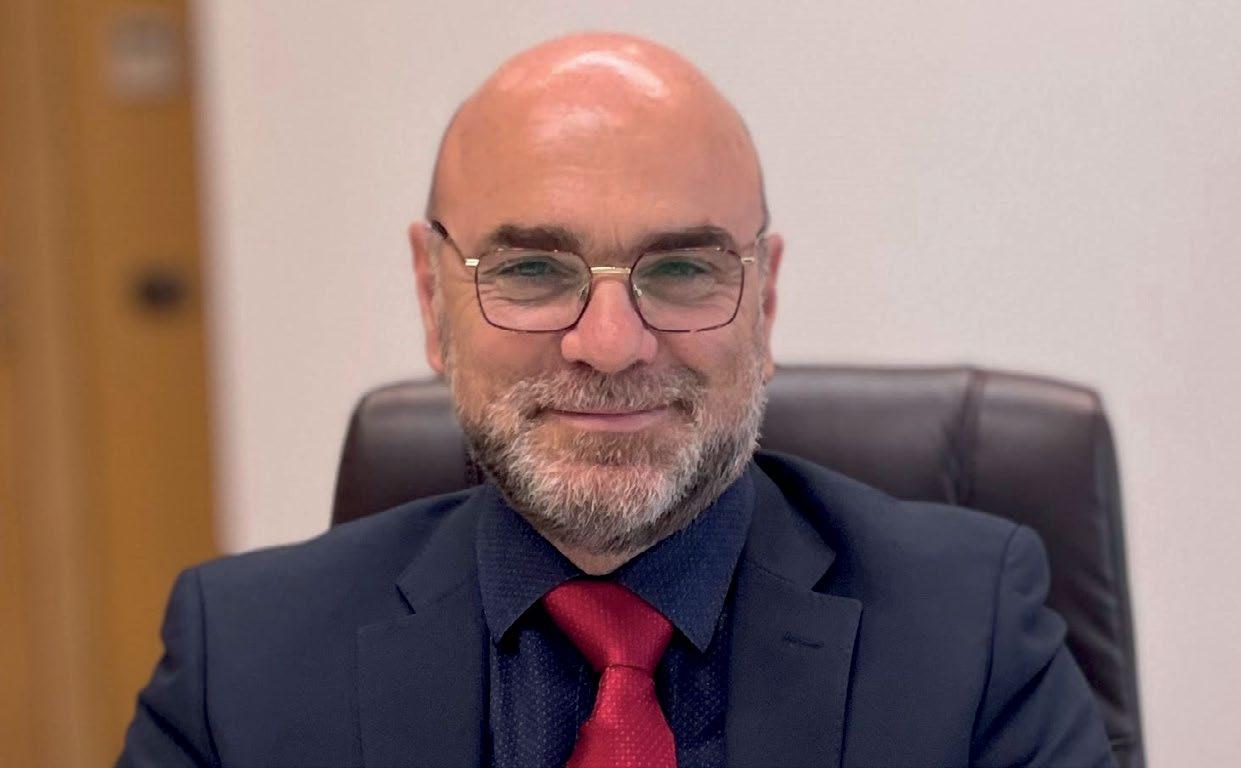
Albania’s energy sector continues to take significant steps to improve efficiency, lower costs and function in line with the rest of Europe. Transmission system operator OST is extending its cooperation with Kosovo, Greece and other countries in the region while observing all the rules and standards of European electricity oversight bodies, which means it will hit the ground running if EU accession talks are successful. The country, which relies almost 100% on hydro power, is also seeking to improve its energy security by adding other sources of power, opening up numerous opportunities for investment and partnerships.
What have been the main highlights in the development of OST over the last three years?
The biggest thing we have done is create a common energy market that will start operating by the end of the year, a Kosovo-Albanian joint venture called Albanian Power Exchange (ALPEX). The line between Albania and Kosovo was made possible through an investment by the Albanian government and Germany’s KfW bank, which supported and pushed this project forward. So that is our main achievement over these last three years. But we also continue to invest in two main areas. We have to improve the quality of the transmission system locally and to increase the number of our interconnectors. In order not to have bottlenecks, we need to make the price for exchanging energy between countries as low as possible, maybe even zero. We have to be one market where we could buy and exchange energy at low cost and possibly zero cost. That will open up possibilities to invest in different kinds of energy resources. We know that humanity will always be hungry for energy: even if the world moves from diesel or fossil fuels to clean sources, it will still need energy. So OST’s job is to accommodate any request and any investment that’s needed to produce energy and transport it at the lowest possible cost, safely and without
technical problems. We must ensure that 100% of energy produced is delivered to customers. This is our vision.
How does a common energy market benefit Albania as well as other countries?
If you buy energy in Germany now, it will be cheaper than if you buy it in the Balkan area, because the wind over there is blowing. You can have a better price in Germany, but bringing energy from Germany to Albania implies an additional cost. But if Albania enters the EU, Albanian and German companies will operate within the same market; there will be no borders, different taxation and so on. So we will benefit in every aspect of our lives when we enter the European community. We will exchange market forces, products, labor, know-how and a lot of other things. Also, consider that we have around 250 – 300 sunny days with 10 hours of sun a day, and around 17001600 megawatt per hour, which shows that Albania is a very attractive place to invest in solar. During the summer, that investment can produce cheaper energy which can be exported to other countries that do not have an opportunity to have cheap energy. So, when you have good interconnectors, no borders, no legal or financial constraints because you are a part of one European market, it creates a possibility for every country to be developed. It creates the possibility to sell better products for a better price and to a bigger market. That is the reason why we have to be a part of the EU.
And how does ALPEX play a role in that vision?
ALPEX will generate ideas, investment, change how energy is sold and how the market is transformed in the future. Right now you produce something but you just have one buyer. In the future you will not have just one buyer, everybody will be free to create a group and to freely sell energy in their best interest. That will generate not only big investments, but also healthy competition. For example, if a company analyzes how it can improve its space and how much solar days they have, they can invest in solar panels because they work mostly during the day, and during the day they can use all that energy which will reduce their expenses.
Are there any pending issues with your company regarding potential EU accession?
No. In a sense we are already a part of the EU because we are a part of the European network, we follow all the rules of ENTSO-E, the European Network of Transmission System Operators for Electricity. OST is already a part of that, so we fulfill all necessary rules and regulations to meet the standards of every other transmission system operator in the European Union. The future lies in better interconnections and better operations, and you can create market coupling which can reduce the price for the end user.
What are your ongoing projects to improve these interconnections?
There is an investment in new interconnectors with the support of KfW. We are thinking of investing to close the link of Tirana to Fier, and then from Fier we can extend the connection to Greece, which will change how we operate with that country. We do not have a high margin of loss because Balkan-area standards are at 2.1-2.2% per year. This is the reason to close the loop of 400 kV in order to cut energy losses. The 400 kV line from North Macedonia to Fier is in progress, it will be finished in 2.5 years. We are pushing Greece to make this 400 kV
extra line so both countries can benefit from exchanging energy from the areas that were always important, from the north and high-consumption south, so we can cut the losses on the lines where energy is produced and near the producer, send energy to the customer and increase our security as power supplier. That is our main priority. And we have another project in progress, the Tirana Ring, which we hope to finish in 1.5 years. This project will increase the visibility of the power supplier of Tirana and Durres, and it will be the base for closing the link from Durres to Fier. After completing the feasibility study we will go into the procedural, technical, legal and financial aspects. But with KfW we have a good vision and a good collaboration. We share a focus and vision, and KfW is a very trusted and helpful partner.
What about private companies looking for new investment opportunities?
We can see big investments over the next seven years up to 2030. We hope that with help from our partners and and maybe other projects from the EU we will finish our network in order to accommodate all the upcoming needs for renewables. The renewables market is very attractive, there are a lot of investment opportunities, not only in Fier but also in a lot of other Albanian areas that have very high solar luminosity. Some of them can have up to 300 solar days and at least 10 hours of high intensity of luminance. What we can offer is a flexible and secure network which can accommodate any need to invest in energy, and an ability to export; they can sell and buy energy anywhere around Europe. Our system is able to support the current production and what will come in the future. We do not see any bottlenecks or constraints.
” We can see big investments over the next seven years up to 2030.
How have you been working with the Ministry of Infrastructure and Energy to reform the energy sector, ensuring industry-wide compliance with EU regulations? What would membership mean for KESH's operations?
The Ministry of Infrastructure and Energy and KESH sh.a. have been working jointly to ensure and expedite the energy sector’s reforms within the country in order to be on par with EU standards and regulations. As a contracting party of the Energy Community, Albania has taken major steps for the implementation of Energy Community directives and measures for the implementation of Energy Community treaty principles and rules. Albania is now under final implementation of the Albanian Power Exchange as a major step in creating the energy market in Albania, which will give to KESH sh.a. the opportunity to operate in a regional market through coupling with Kosovo.
Furthermore, KESH sh.a. has foreseen on its strategy to diversify its generation portfolio in renewables (solar, wind, and further hydro generation) in order to ensure increased energy efficiency and affordability. KESH sh.a. will also exploit its position in the service and balancing market. Having said that, the Ministry of Infrastructure and Energy and KESH sh.a. are confident that Albania’s EU membership would further expedite and facilitate our energy market liberalisation, growth, and maturity as well as provide new cooperation opportunities to the energy industry overall.
How has KESH contributed to improving the country's energy security, resilience, and capacity?
According to the statistics on the current rainfall conditions, Albania is going through a period of drought due to the lower level of precipitation when compared to the previous year-to-date levels. As a consequence, this deficiency in rainfall has negatively impacted the power generation capacity of the Drin Cascade HPPs as well as the other minor HPPs in the region.
In such circumstances, KESH sh.a. (Albanian Power Corporation/Energy of Albania) strategically focused its activities primarily on 2 directions: To further increase the water consumption efficiency of the Drin HPPs for electricity generation, and; To procure electricity through various energy sources. Hence, a perfect example of the aforementioned strategies would be the installation of Qyrsaq PV (photovoltaic) plant on the dam of Vau i Dejes, representing the very first renewable energy diversification project by KESH sh.a. as well as the first PV plant installed on a HPP dam in Albania. Qyrsaq PV has an installed capacity of 5.14 MW and is expected to have an annual average production of approximately 7 GWh. Similarly, KESH sh.a. is currently studying and assessing the possibility of installing yet another PV
through a carefully planned strategy and continued successful cooperation with our international partners.
The ongoing strategic plans and investments aim to:
• Diversify energy production from renewable sources
• Increase the country’s energy supply security
• Smoothly overcome the negative effects of the energy crisis in Albania
• Increase the efficiency of the Drin Cascade through a hybrid system that combines the hydropower and solar/photovoltaic energy production
pendence on rainfall deficiency for hydropower plants, coupled with the soaring global energy prices, have undoubtedly posed great challenges on our overall operations.
Moreover, the ongoing war in Ukraine has sharply increased global energy prices as well as increased the urgency for immediate energy diversification by pressuring the industry to hastily find new energy sources and reduce if not avoid dependency on war affected areas.
plant on the dam of Zadeja (part of Vau i Dejes HPP) with a potential installed capacity of 8 MW and an approximate annual production of 11 GWh. Last but not least, a firstof-a-kind investment in the Western Balkans renewable energy diversification initiative is the EBRD financed floating PV plant on the surface of Vau i Dejes HPP reservoir with an installed capacity of 12.9 MW and annual production average of approximately 18.5 GWh. This particular HPP and floating PV hybrid project will promote the further use of the floating PV technology in the region in order to increase the solar capacity through the efficient use of existing hydro reservoirs.
That said, the end goal of KESH sh.a. is to increase the installed capacity of Vau i Dejes up to 50 MW in the near future
What is the collective impact of climate change and unpredictable renewable resources, the unforeseen consequences of the green transition, and the war in Ukraine on Albania's electricity production sector?
As was mentioned by the Minister of Infrastructure and Energy Mrs. Balluku, those 3 challenges are indeed the cause of the current energy crisis in Albania and all the more reason to expedite energy reforms and diversification.
To begin with, we’re all witnesses of the magnitude of the ongoing climate change and its environmental impact, to the point of directly affecting even the energy production industries that rely on renewables, as is the case of Albania with its hydropower plants. In addition to that, the unpredictability of renewable energy such as the de -
In response to those 3 challenges and in anticipation of future climate/ environmental changes and global crises, KESH sh.a. has developed a risk management implementation plan that is focused on energy supply security and the diversification of energy sources in order to:
• Increase the energy supply security for our customers
• Reduce the dependence on a single renewable resource alone
• Reduce the energy import dependence and its potential high prices
• Reduce the dependency on war affected countries
Despite the profound effects that the aforementioned challenges had on the global economy and the energy market, KESH sh.a. managed to successfully shield its customers from the soaring electricity prices and continue its daily and strategic operations through the immediate implementation of the crisis risk management plan.
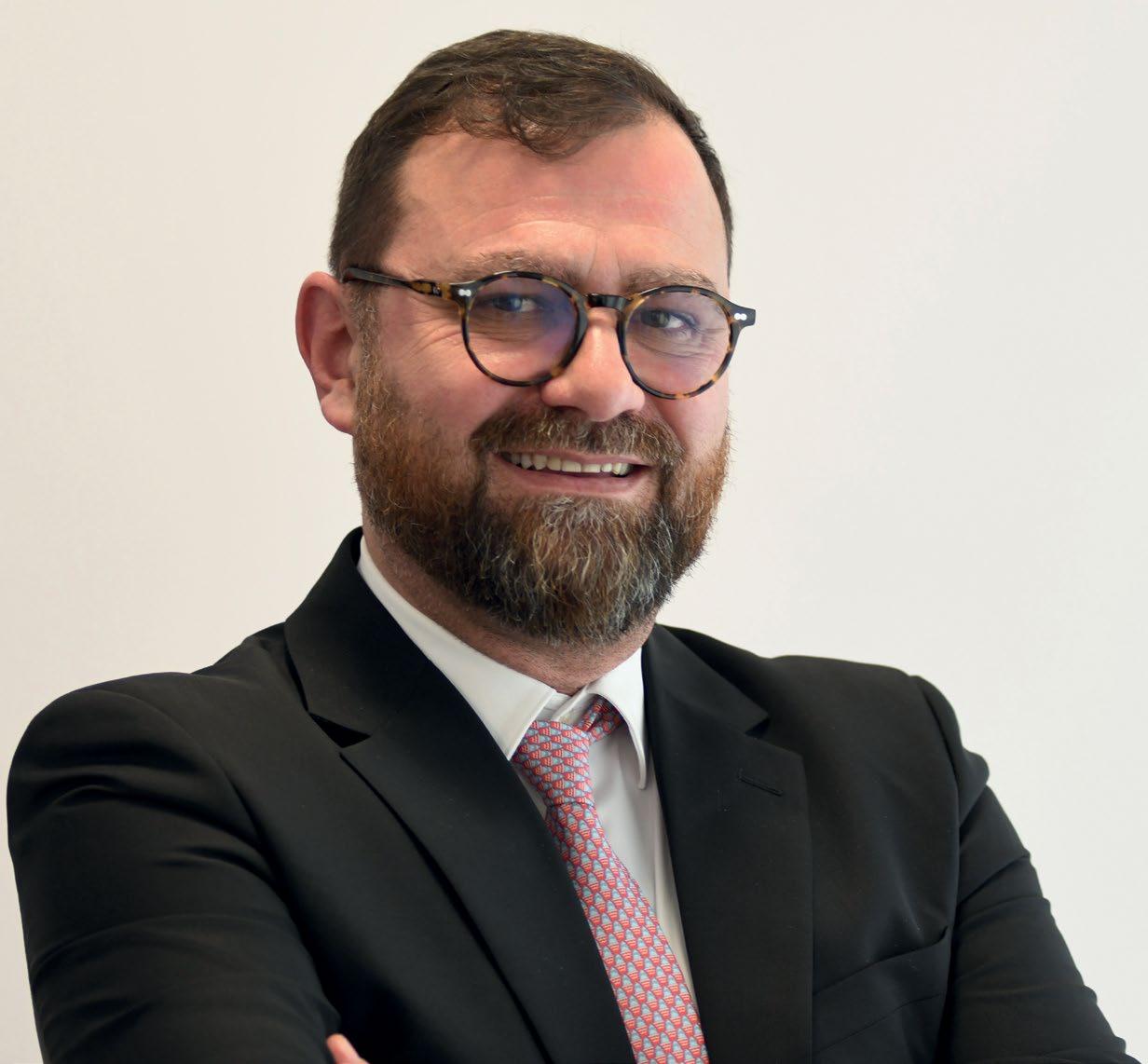
CEO,
” Albania's EU membership would further expedite and facilitate our energy market liberalization, growth, and maturity.
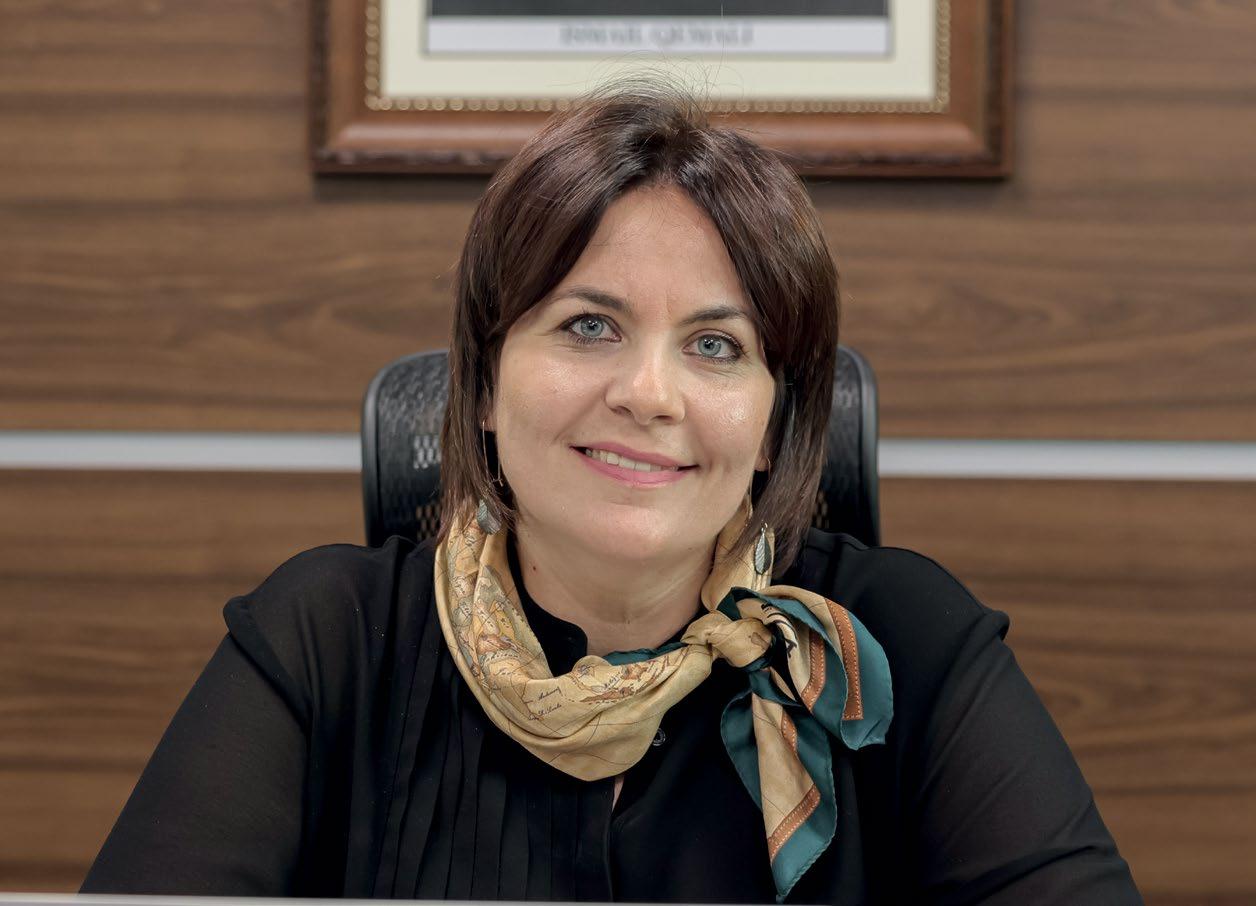
As the national postal service of Albania, Posta Shqiptare runs one of the country’s largest distribution networks, making it a potentially key partner for businesses looking to sell their products in the region. The company is also working on an ambitious plan to expand into e-commerce and financial services, and to become a gateway between the Balkans and Europe.
Can you give us an overview of Albania Post, and why you see it as a national asset?
We are a big company with over 2,500 employees, of which 61% are female, reflecting the fact that since the beginning of the postal service women were at the center of telecommunications. This is an institution with a 110-year history that begins in 1922, when it joined the Universal Postal Union (UPU), a UN agency. And the history of the postal service is the history of the state itself. Up until 1933 we had aircraft in Albania that were used only for postal service between cities. All the transitions that this country has experienced are somehow tied to the postal service. And then there is the philately, considered a valuable asset for collectors throughout the world. The history of Albania is expressed from 1922 to the present through stamp emissions that show the artistic and diplomatic ramifications. And the amount of valuable data that we hold is huge: Albania Post is the interface for utility payments for many people. So we are not just an office that you walk into to conduct business, but a national asset that holds the history of this country. We have a permanent exhibition open at all times to learn about the history of this institution.
The first one is to minimize abuse and corruption as we prepare to approve the project of the national card payment. We want to offer qualified services for Albanians getting their retirement packages or social aid from the government, by institutionalizing those payments directly through a card, which would min-
imize the risks and let Albanians abroad get their benefits as well. We need to educate the public about moving to a cashless society and digitize the agenda of all government institutions and related services. This is a big revolution for the country, and we will be the first in the region to launch such an initiative. The second goal is our transformation into a banking sector, and this requires considering other products and services. This is why we are keen to learn from similar experiences by other European postal services. The third goal is developing and promoting e-commerce, which we believe is the key element that will foster the development of the postal sector. For each of these broad targets there are several objectives that need to be complied with, such as human resources and restructuring the finances of a company that needs to expand and increase profit margins. We need to incorporate more new products so we can be a onestop shop for clients, whether local or international ones.
security levels have increased, and all these factors are putting pressure on the postal service, which needs to expand its range of products and services and move into financial products, e-wallet payments and e-commerce. Another relevant issue is the fact that the percentage of people with higher education is low compared to those with middle and lower education, and this needs to be addressed if we want to expand and offer banking services.
What are the main challenges you face as you work towards these goals?
When I accepted the position I took on the challenge of making this a profitable company and attractive not just to the older generations but also for the younger ones and for foreign visitors, to let them know we have the same standards they would find at home. We need to bring new potential into the market to offset the high fixed costs of infrastructure and employees, and we need to input new products and services. Postal offices have a high cost, yet according to Albanian law we need to have one office per community of 5,500 people. At the same time, postal offices are losing revenue as everything is increasingly electronic and people do not send letters the way they used to. Digital channels are taking center stage, we are using data services,
The only way to revolutionize a company is to change mindsets, and that is my challenge, to make these employees enter a competitive market and comply with the standards. The checks and balances need to be there, and everyone must know that there can be no abuse of their public post. The new products and services we are planning to launch, including possibly banking services, will require highly skilled employees, and once you set these standards, the revolution will be underway because people will request additional training to rise to the new standards. As long as you set the bar high, people will rise to the occasion, and the others, well, they will have second chances in life.
efit from joining forces with Albanian Post?
The fact that we have so many postal offices means that we have one of the biggest distribution networks in the country, and potentially one of the most profitable if it were to join forces with a partner. A business could sell its products through our network, for instance. One real-life example is a contract we have with a big
company that sells books online, where we offer a special fee for national and international shipments. Another example is our recently launched e-commerce platform. We want all start-ups in Albania to be part of the network, and we will be very supportive with branding, business plans, fiscalization procedures and more. This would allow them to access the market not just through social media, as we would help them become part of the system with customized warehousing options at lower than market rates, plus we would provide postal support. We are also the only ones offering e-payment solutions. If you have an e-wallet at Albania Post, through an app you could pay all the utility bills and make e-commerce payments. If you want to develop your start up, you have an open door here.
You mentioned learning from other European postal services. Deutsche Post is a big company that has made big advances in many ways. How can you learn from their best practices? One of our challenges is fleet management, and we are observing Germany’s investment in this aspect, and the fact that their fleet is now entirely green. We need to expand our own fleet significantly, so that no postal employees needs to walk to deliver packages. The goal is being able to deliver anything within 24 hours, 365 days a year. Of course Germany does not face the same problem as we do in Albania, where there is no integrated system of fixed addresses, which makes it hard to locate people. Most customers complain about that. We also don’t have a standardized SMS notification system for customers, although we are working to make it happen within this year.
”
We need to incorporate more new products so we can be a one-stop shop for clients, whether local or international ones.
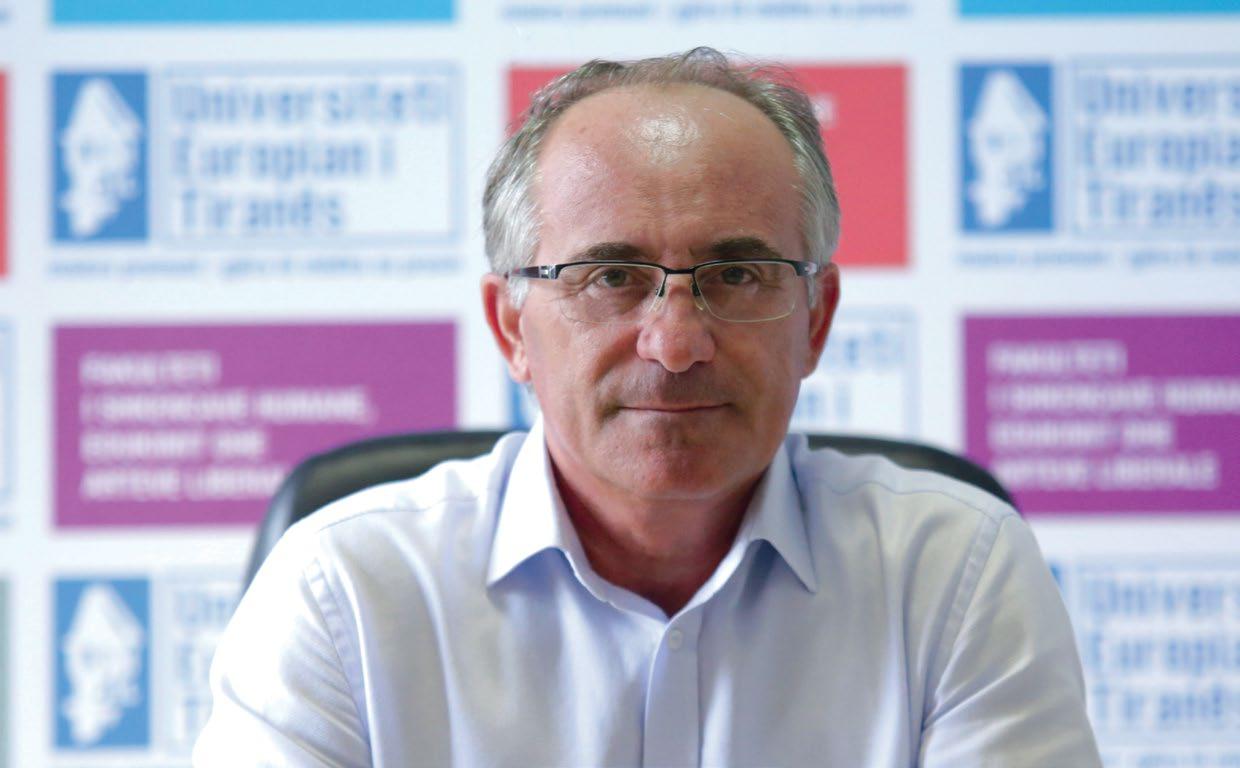
The European University of Tirana (UET), one of Albania’s leading private learning centers, has been accredited by a number of international agencies, including Germany’s CHE. Since its foundation in 2006, it has expanded from a focus on law and economics to a wide range of degrees that are uniquely adapted to real industry needs. The university, which already participates in European exchange programs, is now working towards greater internationalization by attracting more foreign students and forging partnerships with other higher education centers.
What is your own background, and how did you end up as president of the European University of Tirana (UET)?
I started my career in academia in the early 1990s, worked for a couple of years at the investment promotion agency, then as chief economist at Albania’s central bank, as an economic advisor to the prime minister, I was a member of parliament for one term, then I returned to the academic world. In 2015 I joined the UET, which had started operating in 2006. The university has a relatively short history but it has proven itself to be one of the leading private higher education institutions in Albania and the largest one in terms of the curricula. Our studies are based on state-of-the-art knowledge but we also work closely with the business world. At first we focused on law and economics, but in the last five years we have been working on delivering programs in new areas such as engineering, computer programming and technical medicine, for which there is a high demand in Albania, as well as the liberal arts. So far we have been very successful, and we have intensive exchanges with other European universities, including some in Germany, both in terms of students and academic staff. Over 250 Albanian students have gone to European universities, and this is an important engine for the improve-
ment of Albania’s education sector, because students see what there is out there and then expect to see the same back home.
What makes UET different from other universities in Albania?
Our uniqueness begins with the fact that from the start it was based on a philosophy of having the very best faculty and curricula, but above all it is our very pragmatic cooperation with the business community that makes us unique. We have even exported our practices to other universities. There is continuous work between the university faculty and the business community, and we bring industry representatives to talk to department members to strengthen our curriculum and even as part-time lecturers. Students graduate from UET fully prepared for the labor market demands.
ICT sectors. Our marketing strategy is to work with foreign countries to identify the target audiences.
What opportunities are there for international students to study here, and what partnership opportunities do you see with German institutions?
diplomas could also be offered with the master’s programs. German universities have a philosophy of work that is based on building technical skills, and we can learn a lot from that experience.
UET has a clear international focus. Who are your students and where do they come from?
The education system in Albania is quite closed, there is not so much exchange and the internationalization process is going slow. We mostly get students from Kosovo, Montenegro and other neighboring countries, as well as from other parts of Albania. But we also have received around 60 students from the EU, including France, Latvia, Italy and Spain to take a semester here as Erasmus students. The future for us lies in greater internationalization and in targeting the foreign student community. Attracting foreign students is a must because it creates a different multicultural atmosphere and adds the flavor of international culture. Last year we started initiatives to offer English-language programs in the finance and
Our first ranking was conducted by the German Agency CHE, and five years ago we were accredited by the British Quality Assurance Agency (QAA); this year the accreditation expires and we are in the process of renewing it. We are periodically accredited by national agencies and we are meeting all their criteria, so from this perspective this process has created the credibility that is so important for the student community when they are selecting an organization. Most of our staff are from a young generation that got their PhDs at European universities and they are back with us now, so they are a real asset because of their international expertise. From this perspective, cooperation and partnership with foreign universities is important for us to grow and strengthen our capacities. We already have one dual diploma project with the University of Sweden, and this idea can be something that takes us beyond the Erasmus exchange program with German universities: perhaps a partnership can be sought to offer a dual diploma so that students in Albania can do part of their studies in both countries. Another field of interest is in PhD and research programs. We can create synergies with German universities and apply for European funding for various areas of research. PhD programs can be major sources of research that we can undertake together, and this could be a very interesting area of cooperation with German universities. And dual
In your President’s s peech you said the biggest challenge for universities in Albania is restoring the trust of the general public in the university system. What reforms are required?
That speech comes from experience with student demonstrations over education reforms undertaken by authorities. We had a chance to reform higher education but it was not supported by funding or a change of philosophy, so it produced disappointment in the student community. The public discovered that the quality of public education is not what it should be, and that created a huge distrust. So we need to come together as a community of universities and create a dialogue on how to improve overall quality in the country.
What is your take on what EU accession would mean for Albania and your university?
EU integration is a major project supported by all Albanians. Polls show that the public trusts EU institutions more than they do their own local institutions. This means that people want more democracy, and EU integration can give us an anchor for future reforms. In terms of education, it can infuse more energy into our universities, create stronger links between institutions in terms of curricula and research, and raise our national standards. All this would create a positive pressure on our universities to improve and become more competitive.
”
The future for us lies in greater internationalization and in targeting the foreign student community.
